#the book i was reading also talked about how that motif may have been influenced by african american folklore which is really interesting
Explore tagged Tumblr posts
Text
learning that women turning into bears was a fairly common story motif from my tribe was the most validating piece of information ive ever received as a artist. im carrying on hundreds of years of tradition by being really loud about my ocs on the internet
#crow.txt#ocposting#the book i was reading also talked about how that motif may have been influenced by african american folklore which is really interesting#a lot of tribes on the east coast intermarried with black communities so cultural exchange was inevitable
41 notes
·
View notes
Text
Okay, a good amount of time has passed, and after having seen this post by @weretiger-be-my-horse , I've been turning it over and over in my brain going absolutely feral over this concept. I need to expand upon my thoughts on this idea and all the evidence there is pointing towards it, whether that be actual tangible things, or purely strong vibes I have.
First of all, full disclaimer: I did not like the season 5 finale, and how it wrapped up the DoA arc. To say that I "disliked" it is putting it extremely lightly, in fact -- I absolutely hated it, and I am still, to a degree, in disbelief that I actually even watched those 24 minutes with my own two eyes, and that it somehow wasn't a complete fever dream. While I'm not going to go in long-winded detail into all the ways that I feel like the finale almost completely bastardized all of its featured characters and destroyed any and all buildup we've had going on in this arc for 50 some chapters now, because that's not the main point of this post, I will not make any attempt to hide the fact that the theory-crafting I'm about to pose here is partly influenced and prompted by how much I hated the finale, and how much I desperately hope that it will not end up being manga canon. Therefore, if you enjoyed the finale — and that's fine! — and don't want to read any negativity about it, then I would not recommend reading any further (I mean, you've probably already left by this point, which is fair lol), While obviously it's important that I be as objective and unbiased as possible when explaining my thoughts, some of my negative feelings about the writing will be a part of this analysis, even if this isn't going to be a full-blown rant. Just know that if you proceed.
With that out of the way, let me continue.
So. In the aforementioned post, the theory presented is that the anime may be operating on an alternate timeline, and that this will become evident once we read the upcoming October chapter, wherein things will go completely differently post-chapter 110 than they do in the final episode — probably for the worse, with the s5 finale intending to lull us into a false sense of security and make us assume that everything in the manga arc finale will wrap up as smoothly and consequence-freely(? lol) as it did in the anime one. It also suggests that the Fukuchi we see at the very end that sskk are fighting came from the manga timeline, where he won, and that he used the Book to jump to a timeline where he lost, the anime one, proven by the fact that this Fukuchi is wearing a mask with the same design on it as the mask Fukuchi is wearing on the chapter 110 DoA color spread/title page.
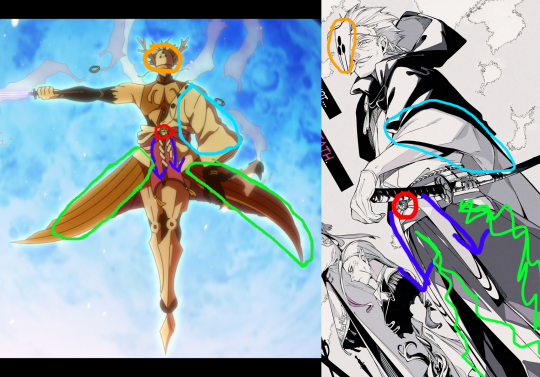
First of all, I want to note the fact that it's not just the mask design that's the same: the entire outfit is roughly more or less the same as well. It's not completely 1-to-1, because the anime can never fully match the intricacies of Harukawa's beautiful outfit designs, and the Fukuchi in this scene has the kimono half-off because of the... super saiyan mode he's in, but most all of the main pieces of clothing are there. Any small inaccuracies could also be attributed to the fact that Harukawa probably didn't have this finalized art ready back when this episode was being made, so the animators wouldn't have had the complete design to work off of. But in general, because it's all so similar, I think we can quite confidently say that the ending episode Fukuchi is meant to be the one from this manga art.
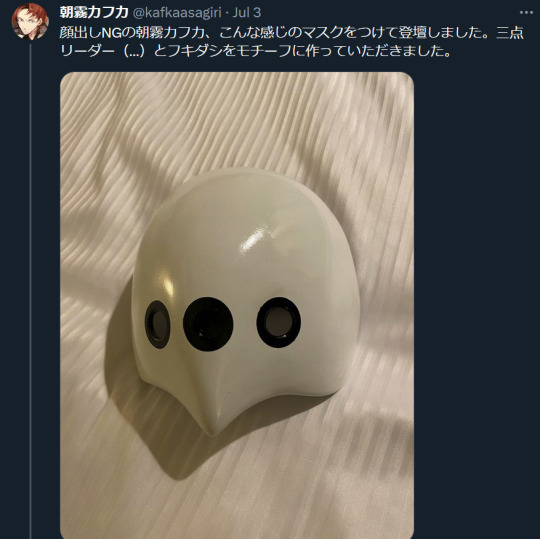
Also, people have pointed this out, but it's worth mentioning that the mask Asagiri wore at Anime Expo in July was referencing this Fukuchi. It's not a crucial detail, but it just proves more that Asagiri is a gigantic fucking troll, and that he clearly wanted to draw attention to this Fukuchi design. It's important. He describes the mask here as made in the motif of an ellipses inside a speech bubble... could that perhaps be referencing meta aspects, like the Book?
Next, I want to talk about the even bigger elephant in the room, which to me is the most damning and undeniable piece of evidence there is of the anime operating on a completely separate timeline from the manga:
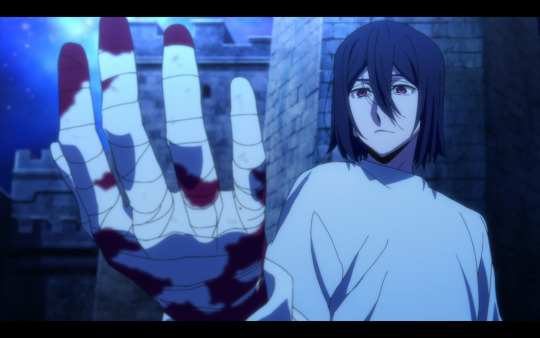
This Fucking Hand™️
As we all know, in the anime, Fyodor injures his hand when the password input device blows up, and as we all know, this does not happen in the manga. In the last episode, Dazai claims that the final nail in the coffin of his impromptu plan to kill Fyodor relied on this hand injury: because Fyodor couldn't pilot his escape helicopter himself, he would ask one of his Meursault vampires to do it for him, unaware that Bram and thus this vampire was now on the ADA's side, and said vampire could kill him while his guard was down.

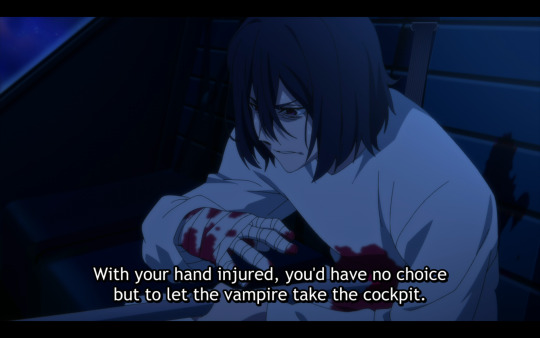
Ignoring how utterly stupid and contrived this plan is when you stop and think about it for more than two seconds, the fact of the matter is that something that initially seemed like nothing more than an odd but inconsequential anime original addition ended up snowballing into being the entire reason one of the big bads was brought down. If Fyodor hadn't hurt his hand, he wouldn't have needed another pilot, and so the traitor vampire wouldn't have had an opportunity to get near him and kill him without him expecting it even though said vampire was presumably with him as they were leaving Meursault, and was probably already a traitor by then, so there was plenty opportunity for him to still die. not to mention by Chuuya's hands at literally any time he wanted to, because Chuuya was coherent the whole time. Also there's absolutely no way Dazai could have known exactly what Ranpo would do, no matter how smart he is and how much he trusts him. idk it's fucking dumb, just roll with it. Therefore, putting aside all other variables for now, we can conclude that, on the most basic level, this signifies that no hand wound = no death.
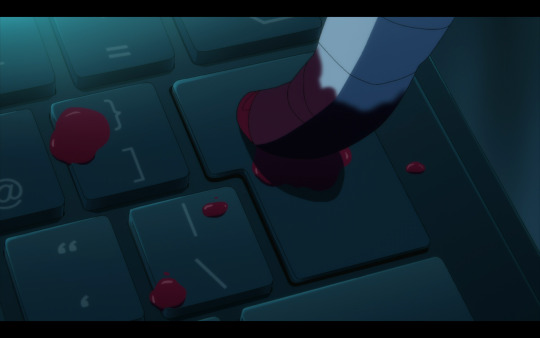
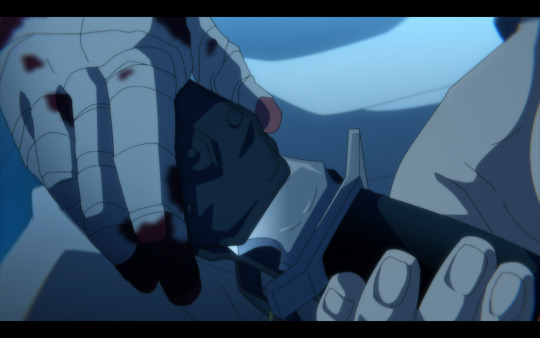
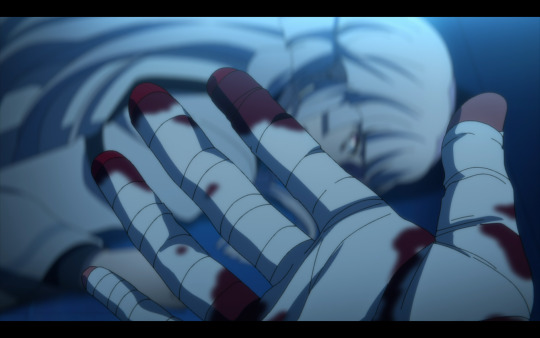
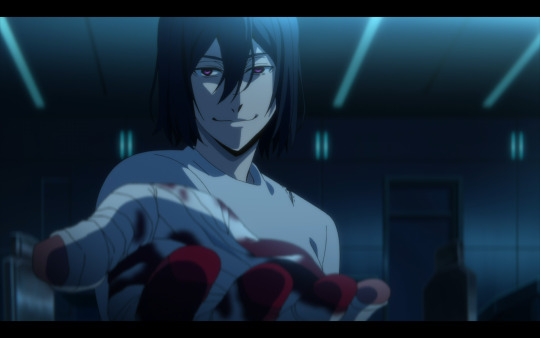

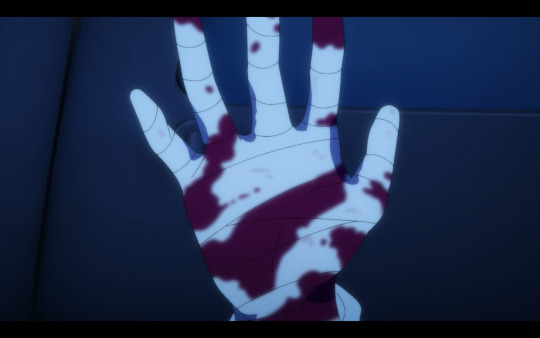


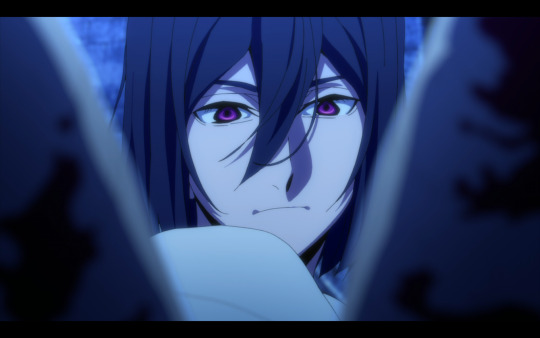
And let me tell you, this hand wound bothers me. It really, really does. Because they focus on it a LOT — they go out of their way to draw attention to it MULTIPLE TIMES, from the moment it first happens to the end of the season. Fyodor even talks about it to himself, about Dazai being able to cause him tangible, visible, bodily harm, (something that, again, as far as we've seen, has never happened in the manga). Hell, even after Fyodor's death, they're still drawing attention to it, because his right arm is all of him that survives, and Dazai picks it up and gives it to Nikolai to do his hilarious sad little gay fondling of it played completely straight even though there's nothing straight going on here at all! It's like it's a big red flashing sign at all times going "you see this injured hand? This is important. Are you picking up that it's important? Are you taking note of it?" Why is that? Obviously, it serves to give us the lore crumbs about Fyodor and "that man", but that's hardly the main, much more glaring reason, as I've already mentioned.
Fyodor doesn't hurt his hand in the manga. Fyodor won't die here in the manga. I am so dead serious by this point about this, and it's not just simply the fact that this was absolutely not at all the time for him to die, or the fact that his hand is the reason for his death in the anime in and of itself, but how much EMPHASIS they place on this, and on the hand in general. What would be the point of adding something like this, if it's not meant to alert us to the fact that it has a major impact on how the story plays out? We all know Bones: they struggle to get right and include everything that's already there in the source material; they would never go out of their way to add something this noteworthy if there wasn't a very good reason for it, if it wasn't absolutely necessary. I've seen a few people bring up the fact that Fyodor gets shot in the shoulder by Sigma and that that could lead to the same outcome in the manga, but I disagree: although he has blood on his shoulder in the manga, it seems like the bullet just grazed the top of it, because his arm and hand appears completely functional afterwards (not hanging limp by his side or anything). But that doesn't even matter, because this isn't even about the semantics/logistics of how the hand wound caused Fyodor's death because again, it's a stupid outcome, or what could serve as a substitute in the manga — thematically, this is a textbook example of the butterfly effect. Countless parallel universes exist within this series, ones where even the most minute differences lead to a majorly different outcome: this just happens to be one of them. There's no reason to think it isn't, and there's no reason to not think that the anime wants us to clue into the fact that things only went as smoothly as they did on the Meursault side because of this wound; in other words, that things will go very differently in the manga thanks to the absence of said wound. They wouldn't have added it in the first place and put such clearly deliberate emphasis on it otherwise.
Things are going to happen very differently in the manga, at least when it comes to the Meursault crew (but then, if you assume that, you then naturally assume it all will be very different). This is the only conclusion one can come to with the presentation of this anime-only wound, combined with the fact that parallel universes are a very real thing in BSD.
I'm going to go on a bit of a tangent, so bear with me. I play a lot of visual novels, and although such concepts aren't really as original now as they were a while ago, some of my favorite and some of the very best VNs out there are the ones that break the fourth wall and make the visual novel branching route format directly intertwined with the story: you know, the ones where the characters go "if only I had done things differently, maybe everything would have turned out better...!" in a wink wink nudge nudge moment, and the ones where the characters are aware of the different timelines, even, or even have the ability to gain information from their selves in said alternate timelines to influence events in their current one (I'm intentionally not naming the games I'm thinking of for the sake of spoilers, but if you know, you know lmao). It gets very meta in this regard, and this is how I started viewing BSD through the lens of ever since I first learned about Beast: like a visual novel with many branching routes, and only a few routes that feel entirely "right".
When I first read Dazai's Entrance Exam, I was struck by how unnerving the ending sequence in the abandoned hospital felt. Obviously, Kunikida's internal struggle over Sasaki's actions and motives is him still desperately clinging to his ideal world that does not exist, but the specific type of phrases he uses — "who is wrong?" "[who is] the cause of all this?" "there has to be an ideal world" "there has to be something, I'm sure of it" "There must have been something we could have done!" — and the framing of the scene in general, is eerily reminiscent of a bad ending in a visual novel, to me. There's a haunting, looming, bleak sense that a different outcome could have been achieved, if different decisions had been made, or if things outside of anyone's control had been different... and we know that this is true, because in Beast alone, Kunikida never goes through the Azure Messenger incident, because Dazai doesn't have his entrance exam. Hell, you could even consider the anime's version of the Azure Messenger arc an alternate timeline in of itself, if you really wanted to, long before we even arrive at season 5.
When it comes to Beast, this timeline has almost the opposite feeling of what I described above, that I've also encountered in visual novels: the idea of a "good route" or "good ending" that still doesn't feel quite earned, or as perfect as one would expect. Beast is presented as the "ideal" timeline purely for one sole reason: Oda is alive. It is the only timeline where he's alive, and keeping Oda alive is the ultimate goal Dazai wants to achieve, the only reason this timeline exists; therefore, disregarding all else, Beast should be the best timeline, because Oda's death is the greatest devastation in the series to date. We all want him to live, so why wouldn't the timeline where he does be the best one? And yet... of course, it isn't. Dazai is alone, and steeped in darkness and loneliness without Oda, and dies by the end of the story for Oda's continued living. Atsushi has Kyouka still, but he's suffering and more traumatized, and unable to heal while stuck in the mafia, and neither can Kyouka. Akutagawa is living a much better life in the ADA... but without his sister, and without what he has from his bond with Atsushi in canon, that isn't replicated in Beast. And Oda... Oda is alive, and he has his children and his novel, but there is a feeling that he is aimless, that something in his life is missing. He has everything he ever wanted, but all that means nothing without what he truly needs: Dazai, and his time with Dazai and Ango at the bar. In this way, things going well and us getting what we want — in this case, Oda living — goes against how it's supposed to be, the natural order, which is why it feels so hollow. In the specific visual novel I'm thinking of here as a comparison (again, shoutout if you know), there's an alternate ending that involves you inputting information you gain at the end of the game very early on in the game, wherein the protagonist now has memories of the future and is able to bypass and prevent all of the events that take place normally. This means that people who die or are hurt somehow in general are saved from that fate, and nothing bad ever occurs; everything wraps up neatly and nicely... but again, there's an undeniable, unsettling feeling of emptiness, of a victory that rings hollow, because what's the point if everything is simply handed to you easily, where's the sense of accomplishment, without any struggles to achieve said victories, or any growth along the way? How can it feel earned if one doesn't have to, in Dazai's words, "scream within the storm of uncertainty, and run with flowing blood"?
You can probably already see where I'm going with this.
This finale feels weird. Really, really weird. It feels too cheap, too simple, too unsatisfying. So much so, in fact, that for almost the entire runtime, as I was bombarded with resolution upon resolution one after another, I kept thinking "There's no way this can be real. Where's the catch? When is the "gotcha!" moment gonna happen? The "it was all a dream" reveal?". And this isn't just because I hated the writing, and that it really did feel like a fever dream watching fanfic levels of bad (actually, that's an insult to fanfic writers, tbh; they could do better) — no, it genuinely feels so incredibly fake. Even upon rewatching it and already knowing what happens, my brain still naturally keeps expecting some kinda of "sike, you THOUGHT!" moment to suddenly appear. It just.... feels "too good to be true". Dazai and Chuuya come out unscathed, and it's revealed that they were never in any real danger to begin with. Fyodor, one of our biggest threats, is dealt with supposedly for good (I say "supposedly" only because of the Jesus line, but if anything imo, I think that's just a hint that this won't be the canon ending in the manga, so in a sense he's going to "come back to life"), and Nikolai seems somewhat at peace with his death. The other biggest threat, Fukuchi, is also dealt with, and he and Fukuzawa get their final moment together of closure. Yes, Sigma is left in Meursault don't even get me started on how angry this alone makes me, and Fukuzawa loses Fukuchi, but overall, everything is portrayed in a positive light, and any negatives or losses are quickly glossed over. Everything is tied up nicely, neatly, and smoothly. ...And that is exactly what makes it feel so wrong, and hard to trust in.
I'm not sure if this will make sense, but to me, the finale is so incredibly poorly written that it almost feels.... intentional. It's so bad to the point of feeling self-aware in how bad it is, how unrealistically happy and convenient an ending it is. It had to end this neatly in order to rush to wrap up this arc for the season finale and not leave the last episode on a cliffhanger — which imo is chiefly the main reason it turned out this way, and, if this whole theory is true, Asagiri just used it to his advantage — and I'm not saying this was probably an effect Bones had in mind intentionally, I'm sure they just threw shit at the wall and went with whatever stuck, maaaaybe with some suggestions/approval from Asagiri, but the result is that you have a conclusion that contradicts so much of what was set up before and goes against so many character arcs, making some characters so out of character and even regressing in their development Dazai. I'm talking about Dazai abandoning Sigma, because he would never; hashtag #NOTMYDAZAI. Also Nikolai, Nikolai for most of that is so ooc I can't even begin to describe it oh my god. Everyone is OOC to a degree though lmao, and opens so many plot holes, to the point that it's impossible not to watch all that and get the feeling that it is subtly saying to you "did you really think it could be this easy? It feels wrong, doesn't it? It doesn't feel satisfying. It feels unearned." I find it incredibly interesting and suspicious in particular that they confirmed multiple theories people had about soukoku in Meursault: that Chuuya slowed the elevator's fall so that Dazai wouldn't die from it, that Chuuya slowed down the bullet so that it only penetrated Dazai's skin and not his skull, and that the both of them used Fyodor's camera angle to their advantage because they knew he wouldn't be able to see certain things from his view. I'm not saying that Asagiri trawled BSD twitter and tumblr after those chapters dropped for the most popular theories before the final episode was made lmao, there was no time for that (imagine though lol—), but I do think it's highly likely that he already had in mind exactly what theories would be made about these parts (I mean, the evidence for the gun scene was all there), and that Dazai rattling them off in his long monologue to Fyodor at the end is essentially him speaking to the audience and going "yeah, that's what you would predict, right? Those are the clichés, after all", much like him suggesting earlier that he can maybe bring Chuuya back to himself with a few moving words and the power of friendship, and Fyodor using the split personalities trope to fool Sigma. We expect these tropes to be true. Of course we'd fall for them, as Fyodor tells Sigma, especially if the evidence is right there. But Asagiri himself has explicitly said that he likes doing the opposite of what people expect. And so just because people predicted correctly with the three things I mentioned in this timeline... doesn't mean they'll be true in the manga's. Things happened how we wanted and expected it to, and everything turned out happily. So we can relax now, right? Everything will work out just as easily in the manga, right? Or... is the reason most of this finale feels so fake and unsettling and unsatisfying because it's meant to lull us into a false sense of security before all our heroes lose in the manga? Because deep down, we don't want an ending that's this simple, because we'd rather have a conclusion where our characters have struggled more and grown more and come out the better for it, and we know it?
After rewatching the episode a lot, and watching some other videos, and doing a lot of thinking, I am pretty confident in suspecting that the only part of this finale that is actually from manga canon, aside from Aya jumping off the building of course, is Fyodor and Nikolai's exchange after Fyodor leaves Meursault — specifically, them talking about Fyodor leaving Sigma behind, and their "new game" and Nikolai being excited at the prospect of it. This little conversation actually feels in character for them, and it's easy to tell this when contrasting it with everything that happens immediately after, wherein Fyodor is fatally stabbed, and Nikolai, completely at odds with what he was just talking about, just... stands there and watches Fyodor die while Dazai monologues lmao. I'm not sure if the helicopter is still a factor, but I would bet good money on Fyolai getting out of Meursault being manga canon, and that Dazai and Chuuya getting out as well and killing Fyodor + everything with FukuFuku, is part of the anime original ending, in order to wrap up everything positively. It makes much more sense if you think about, in reality (aka in the manga), Dazai and Chuuya still being left behind in Meursault (where they can eventually try to get Sigma), because none of it was an act and things did not go according to plan, and Fukuchi having an entirely different goal that doesn't feel so stupid and contradictory to his character, and Fukuzawa possibly dying — everyone seemingly loses, with Aya still being the last hope, perhaps by awakening her ability like we all speculated.
There's a youtuber I watch who covers BSD in-depth, despite being an anime-only (she reads the respective manga content after each season, though). Going into this finale, she knew about the fact that the anime had overtaken the manga, though she didn't know where the cutoff point was; despite that, however, she made predictions about what was from the manga so far and what was anime original, and it was almost entirely spot-on, based mostly on what she basically described as "anime original dialogue." She talked about how you can always tell when dialogue is veering into the realm of anime-original, because the sentences are very short, choppy, and slightly out of character, but generic enough to not be TOO out of character, and so that anyone can easily write said lines, even if they're not extremely familiar with the character like the original author would be. And when I heard this explanation, everything clicked — because so much of this finale has dialogue like that. The Fyolai scenes just feel peppered with it, around the lines I mentioned earlier, the Dazai dialogue does too, and ESPECIALLY shit at the end like Fukuchi and Fukuzawa exchanging the cliche death lines to end all death lines: "Are you there? I'm a little tired." "Rest up." That just isn't Bungou Stray Dogs. That isn't Asagiri. BSD is cheesy at times, yes, but it isn't like this; it's smarter. The dialogue is smarter, the explanations/plot twists are smarter, Asagiri is smarter, and the aforementioned youtuber I watched agreed. She's a pretty casual fan of the series, so if even she could pick up on these things, I think it speaks volumes.
I mentioned this briefly earlier, but this theory makes sense if you consider that this situation probably came about because of Bones wanting two seasons back-to-back when they did, and this arc being as long as it is. Season 3 aired in 2019, and I imagine Bones would have wanted season 4 in 2020, and might have then been willing to wait a bit longer for season 5 in order for more of this arc's manga chapters to come out — but then covid happened. Because of that, season 4 was delayed to 2023, creating the longest gap we've had between seasons, and I wouldn't at all be surprised if the delay made them want season 5 right together with it, after getting so far "behind", so to speak. S4 was announced in November of 2021, and roughly around that time, Asagiri was finishing up writing the plot of the DoA arc. If Bones came to him sometime in late 2021 and said they wanted two seasons now (so basically, one giant two cour season), Asagiri would know that not only of course would this arc not be finished publishing in the manga for a very long time yet, but that roughly 20ish episodes would not be enough to cover it all to the end, with this arc being longer than any arc the anime has adapted to date. Because of all this, and the arc manga chapters being nowhere near fully drawn to completion, he'd have to make a decision about what to do, and what to give Bones. Without ending season 5 on a massive cliffhanger that wouldn't be resolved for years until an eventual season 6, the only other option would be to rush towards an anime-original ending for the DoA arc.... and for Asagiri to take advantage of that, and integrate it into BSD's lore. Thereby creating a truly unique cross-media experience that utilizes the different mediums to create multiple timelines, that could make both the anime and manga interact with each other and become part of a bigger picture (not that you'd need to see both to get the full experience, mind you, just that it'd provide a little bonus if you did).... and would without a doubt be Asagiri's biggest surprise yet.
...I feel like at this point I'm starting to ramble, and my evidence become more and more incoherent and less substantial lmao, so I should probably end this post. 💀 Thank you if you've read this far, and hopefully it made some semblance of sense, despite not being structured very well; I know I promised at the start to try to be as objective as possible and curb my negative feelings, but I'm not sure how well I succeeded in that regard. If it weren't for the Fukuchi thing and the Fyodor hand thing, I probably wouldn't take how wrong and strange and bad the finale feels to me as serious evidence about it being an alternate timeline, especially since I seem to be one of the only people who actually hates all of it.... but combined with everything else, I am just so convinced of this theory being true. It started off as pure copium, but as more time has gone on, I fully, 100% believe in my bones (ha) that there is no way that finale is the same Bungou Stray Dogs I know and love, for so many reasons. It just isn't. It can't be. I know BSD better than this, I know Asagiri better than this, and I know that it's absolutely in the realm of possibility for him to cook up this whole scheme to completely blindside us with in the upcoming chapters, because that's exactly the kind of shit Mr. "Please Be Surprised!" himself would pull. If I end up being completely wrong, I guess I'm wrong, and you can laugh at me all you want then.... but I just know that ages ago people were teasing the idea of the anime operating on a different timeline from the manga, and I truly do think that only now are we finally seeing that idea come to fruition, as a setup for Asagiri going full-bore insanity with the Book in the upcoming arc(s). if I and the OP of that theory end up right, this will be the wildest time in the BSD fandom's history.
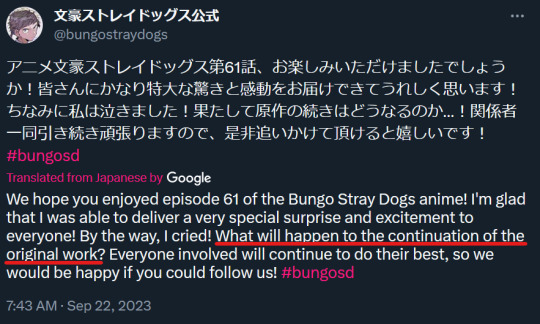

Like. I cannot even emphasize how hard they are trolling us at this point. Something is going on. Something is being cooked over there, the likes of which we've never seen before... and I don't think any of us are ready for it.
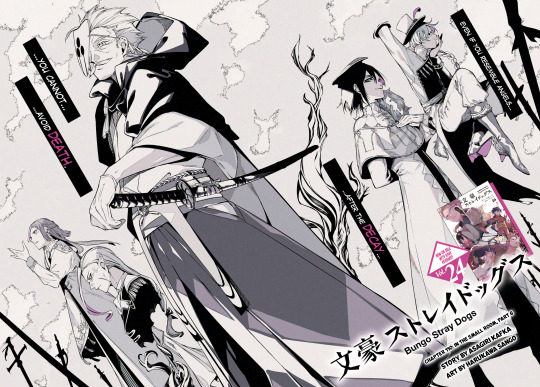
Oh yeah, and one last thing of note: both Fyodor and Nikolai here have their right arms hidden from view. Is that alluding to anything? I'm not sure. I also think that since chapter 110 was so short, next chapter will likely be 110.5 instead of 111, and if that's the case, this title spread could still technically be associated with the next chapter... wherein we might see this Fukuchi, who ends up wreaking havoc, right before he jumps to the timeline in the anime, as we see him at the end of the s5 finale.
I guess we'll find out on Tuesday.
#bungou stray dogs#meta#bsd season 5#bsd s5 spoilers#alternatively titled 'when you copium so hard out of stewing in your denial anger and grief that it becomes reality'#is it still copium if there's strong evidence for it? idk#i DON'T know what i'll do if the stuff in this finale ends up being canon :))) make no mistake about that#but until the very moment the schrödinger's cat box is opened and i am forced to acknowledge it with my own two eyes in chapter 111/110.5#i am choosing to stay calm and rational and look at things with a sound mind... and acknowledge all the signs that are there#of which there are so many#Asagiri is a troll. he has always been a troll and this is more evident than ever lately#and he would know that everyone who watched the finale would take it at face value#never expecting it to go completely differently in the manga#and he's so much smarter than what was in that finale. he would never write those things. i would stake my life on it.#i don't care how many flaws BSD does have that i do acknowledge; he is a good writer in so many ways and he is so much better than /that/#i could fill an entire BOOK (ha ha) with all of the reasons why this finale does not work. seriously it is a never-ending can of worms#of ooc characterizations and plot holes and abandoned threads and straight up CONTRADICTIONS with what has been stated before in the arc#with fukuchi's motivations and presentation; with things that were happening in meursault; just.... so much illogical shit in general#THE MACHINE HEALED THEIR WOUNDS??? ARE YOU FOR REAL????#*sigh* but i said i wasn't gonna rant alskdjgfkdls#tbh though the only REAL thing i need to know that the finale was anime only was what the youtuber i watch pointed out:#that Bram magically regenerated all his clothes. because if it were Asagiri Bram would be naked from the shoulders down fjdkslsaskd#...anyway. This theory is real and true. I am manifesting it into existence 🙏🙏🙏#Asagiri my man...... you have never let me down yet in all the years I've known your series. Please don't let me down now.#I'm trusting in you more than ever right now...... and your ability to blow all our minds in the best possible way#(guys i'm really really really scared deep down; please hold me hahaha ahahahahaaaa- *cries*)#this would the coolest thing in the history of ever though if it happened though. I am SO EXCITED FOR THE POSSIBILITY!!!!!#ASAGIRI YOU SICK AND TWISTED MF; HOW DARE YOU MAKE ME BEG FOR MY FAVES TO SUFFER JUST SO THAT THIS BAD WRITING DOESN'T BECOME REALITY!!!!!!#he knows exactly what he's doing *SCREAMS* :))))))))
75 notes
·
View notes
Note
Hii tamelee! If I remember correctly, you’re studying storytelling, is that right? I wondered if you could explain in details what kind of school you’re going, or just what exactly you are doing in your studies? If it’s okay with you of course 😊
Have a good day :)
Hi~! Yeah, sure!
I did marketing, (communication and entertainment), but then finished audiovisual and graphic design because I liked that much better than learning about how manipulative the industries are tbh. Unfortunately, I found out quickly, that pretty much every job in that industry has been taken over by AI and that even me learning how to draw wasn’t going to help me with that anymore either 🥲. Then, I continued doing Storytelling in the communication sector (where, yet again I learned about all the ways people are being manipulated -.-) because it’s quite a new official study. And then, I was accepted to apply for the program that focusses more on fiction— and got in. Which I’m doing right now (though I’m almost done).
In short, what I learned about Storytelling in business is that organizations use the elements of fictional storytelling combined with science (both internally and externally) in order to influence and convince the attitude, knowledge and behavioral patterns for the right audiences that are targeted by a certain communication goal. That goes so far that even the science about our brains are dissected to figure out the best ways in which the organization can redirect your neurotransmitters and hormones to benefit the storyteller. Even if you know you’re being manipulated, (for example, through a commercial that’s shamelessly stomping on your morals through a guilt-trip, or a product in the store that’s obnoxiously being shoved in front of you), often it’s still about targeting your subconscious and trust me when I say that if you enjoy spending time on the internet, it happens to you all the time and you don’t even know it :D
And yes, companies like shueisha/VIZ are masters in this as well— hence me disappointingly complimenting that skill at times.
So, imagine my joy when I crossed the bridge toward fiction.
Fictional storytelling is where I dissect not the science of a human brain exactly, but the story that’s being told. I have to figure out all the elements and literary devices that are being used and what they mean in the story. Not what it means to me, but finding meaning through the Theme the author/creator has used, and why. It’s about how a story is structured and what impacts people on an emotional level for their benefit (mostly). Why a story works and keeps you up all night, why others are usually almost always forgotten quickly. It’s not as subjective as people may think. Interpretation doesn’t mean much unless there’s intentionally room for it. (And when something is intentional or when it’s not.) There’s also science in its logic, but that’s not something most authors/creators focus on. And they really shouldn’t have to imo. It’s also knowing about character arcs and how to implement symbolism and motifs effectively. I have to write essays on movies and books or even TED talks. It’s using knowledge to figure out the why, what and how.
I think it’s awesome as a study, but other than some creative writing lessons, it won’t help me with great prose. It’s hard for me to connect with my own emotions and body which is something a lot of great authors can do really well. Either naturally or having to have practiced the connection with their personal emotional intelligence in order to write their Truth in their own authentic way through their characters. I read many books outside of my study from scriptwriters as well which were helpful. None of it is any reassurance I’ll be able to write my own story effectively though. It’s more a guideline of sorts with knowledge and structure which a neurodivergent like me (yes, I’m diagnosed officially) really needs xD. I still have to practice a lot! ^^ Hope you have a good day as well 🌷!
10 notes
·
View notes
Text
Trigun Book Club Update: The Inevitable
So some of you may have noticed that I haven’t posted any updates lately. That’s because I went on vacation for a few weeks and didn’t have my laptop with me (where all my Trigun volumes are stored). I was planning on reading ahead and scheduling them to post on time, but who would’ve thunk that the few days before going on vacation are spent prepping for the vacation (I’m being sarcastic, but I did bite off more than I could chew). Seeing my vacation coming closer and closer, I knew this update was coming. I wondered if it would happen before I even started and I wondered if it would happen once I finished volume one and saw what I was getting myself into. So here’s the thing: I’m dropping Trigun. This will be my last update, but I really wanted to thank you all for reading with me and truly making my time with this manga way more enjoyable than I ever would have expected.
Trigun is not a series that I ever would have picked up without outside influence. I’m very good at knowing what I’ll like, but that comes with the downside of not stepping out of my comfort zone all too often. This was very outside of my comfort zone, so once again, I thank you all for that. I’m not good with action, and even though I really did like the story and characters and all those juicy themes and motifs, I’ve been feeling lately like going through all the action and “boring” parts (I’m probably the only one who’s ever thought that) aren’t exactly worth the payoff. When I’m five volumes into a series and still wondering when it’s gonna pick up, it’s time to accept that the problem isn’t the manga; it’s me. And I would never call Trigun a bad series! I truly do think that it’s a wonderful series, it’s just time to accept that it’s not for me. I’ve completed my yuri duty. So many Trigun fans gave This Is How You Lose the Time War a shot, so I gave Trigun a shot, and I’m glad I did, even if it didn’t really work out.
This might sound counterintuitive, but another reason I’ve decided to drop Trigun is because I’m having a great reading month this July. I think I’ve read more books this month than I’ve ever read in a single month in my life. My reading spreadsheet is worn down to a nub! This is the first time in the few years that I’ve been learning Japanese that I’ve read two volumes of manga in a single day and both had time to do other things and not felt like my brain was melting at the end of the day. So anyways, I’m enjoying what I’m reading so much that I’d rather not force myself to read something that I’m dreading picking up in the first place. Plus, I’m already participating in two other book clubs this month where we’re reading series that I know and love (No. 6 by Asano Atsuko and Sasaki and Miyano by Harusono Shou for everyone at home wondering). Once again, thank you all for encouraging me to pick up something that I otherwise wouldn’t have. It’s been a blast reading with all of you.
Now that I no longer have to avoid Trigun spoilers like the plague, I’ll probably go through and see who followed me during this book club and follow some of you back. Additionally, I don’t talk much about manga on my tumblr (outside of the occasional HikaNatsu rambling), but if you’d like to keep up with what I’m reading and recommending, I have a MyAnimeList that stays pretty up to date with my manga readings, and an instagram (@ nobodysmanga) where I post things more like reviews and recommendations. And lastly, I leave you with a manga recommendation: read The Summer Hikaru Died by Mokumokuren. The first volume just got released in English earlier this summer! Actually wait, it would be funnier if I recommended a yuri manga. Read Whisper Me a Love Song by Takeshima Eku, it also just got optioned for an anime coming in January!
#trigun bookclub#take a shot every time i use a parenthetical#queueing this and hoping i forget i did so tomorrow#i really did enjoy my time here and seeing everyone's thoughts and comments im just not enjoying the books
1 note
·
View note
Text
little women, ep. 1
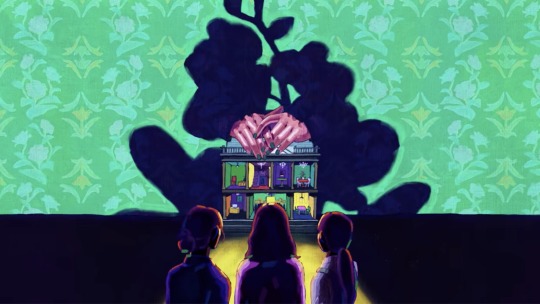
When I first watched the trailer for Little Women, I was intrigued by the premise of struggling sisters navigating the mystery around a huge amount of money, and how it changes the lives of these three “little women” in the midst of big people with power, connections, and wealth. It’s not entirely a new concept, but I am such a sucker for kdrama sister portrayals that this was a no-brainer addition to my to watch list.
Sure, one can first get caught with matching the characters and scenarios with the Louisa May Alcott source material (who’s the Jo? the Amy? the Meg? the Laurie? etc.), but by the second half of the first episode, you get the sense of considering the story on its own.
And it’s good. It’s so good! I don’t expect myself to be able to sustain an entire series review, but I’d like to be able to take notes along the way. It feels like it’s going to be a great watch ahead, and I just want to make something out of my excitement. That said, be warned that the series in itself has a lot of violence, which might come up in these recaps, hence the tw tag.
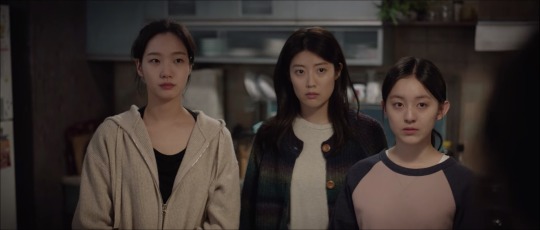
We begin with our three sisters: the Meg, the Jo, and the Amy. Poor Beth, no counterpart in here. Or maybe there’s more we don’t know, because mysterious baby picture, anyone?
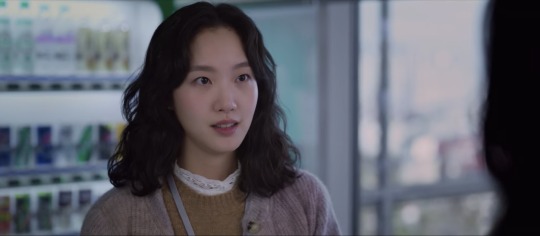
Among everyone, it’s Kim Go-eun that I was really looking forward to the most. I have never watched her past dramas, but I’ve been itching to see any of her work, and I felt that this role might just be too good to pass. I love the seeming naïveté of her Meg, whose Cinderella fantasies of getting married and being whisked away from poverty translates fittingly into our series’ Oh In-joo, dowdy green vest and tacky tulle skirt included. At home with her sisters, though, she can be straightforward and determined behind the smiley and meek behavior she shows outside.
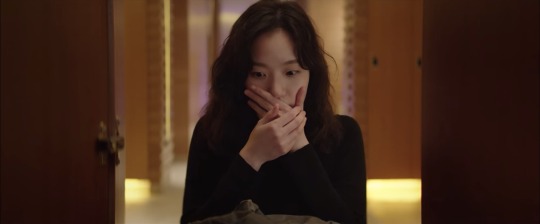
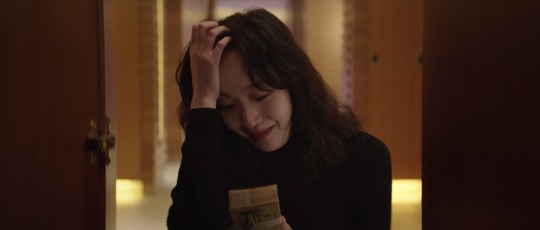
When she cried upon seeing the contents of the duffel bag her friend, Jin Hwa-young (played by Choo Ja-hyun), left her, I felt as if we were witnessing only the initial unraveling of her character.
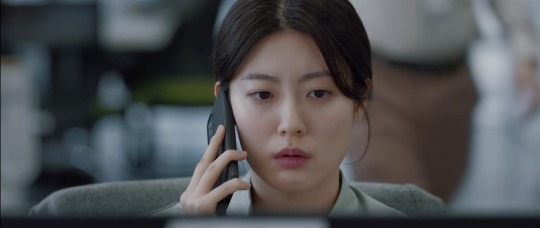
Nam Ji-hyun as Oh In-kyung is also riveting. This is my third Nam Ji-hyun drama and the other two had her as the childhood-friend-and-fated-endgame of a wealthy amnesiac. Here In-kyung is barefaced, buttoned up, but not quite sober. She’s an investigative reporter with a deep empathy for people, and a righteous understanding of the pitfalls of wealth.
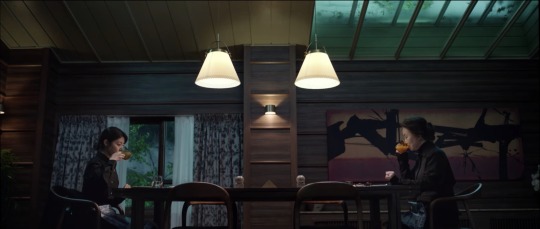
I loved her scene with Great Aunt Oh. They’re just having breakfast and talking, but the way this was set up made me wonder if we’re supposed to look at how In-kyung was influenced by her aunt despite not having had the warmest upbringing.
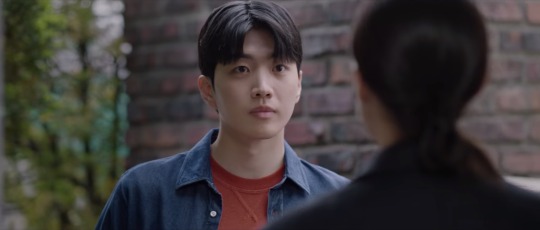
Great Aunt also meddles in her love life, and we see the Laurie for this series, too. It’s Kang Hoon as Ha Jong-ho. When they met each other under aunt’s ruse of bringing a mistakenly delivered package, we understand that there’s history between them. In-kyung is at the tail of a highly tense investigation, and we can wonder how this might affect their relationship as the series moves forward.
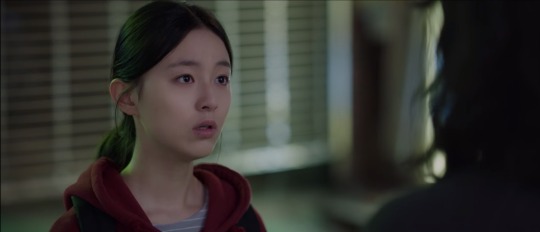
I don’t have much to say about Park Ji-hu’s Oh In-hye just yet, except that I can certainly understand her wanting to make her own money after seeing her sisters toil to provide for their family. She’s ambitious and gritty and I cannot help but wonder where the story will take her character, especially with her association with who seems to be Park Jae-sang’s wife and daughter.
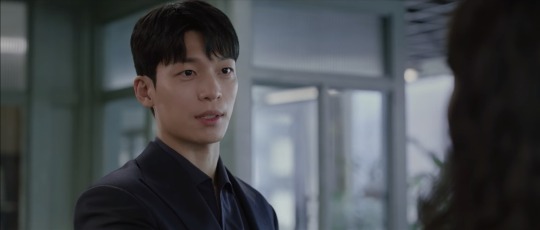
Wi Ha-joon is another actor I was excited to see in this series. I thought his character in Romance is a Bonus Book was compelling enough. His role as Cho Do-il is obviously different so I also cannot wait to find out more about him.
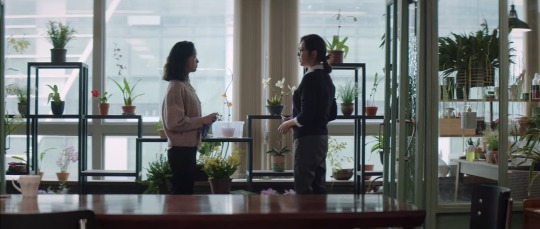
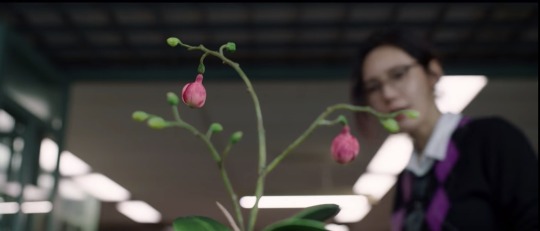
It seems orchids is a recurring motif in this show. From trying to google ‘princess of thieves orchid’, I saw some twitter threads on the repeating symbolism of this flower on the show. Since I’m behind watching, I didn’t read too far and suspended spoilers. Anyway… too many orchids. From the orchids in the office in the 14th floor to…
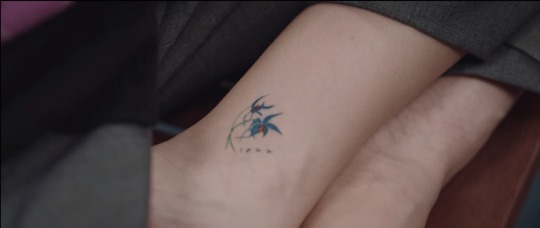
the blue orchid tattoo…
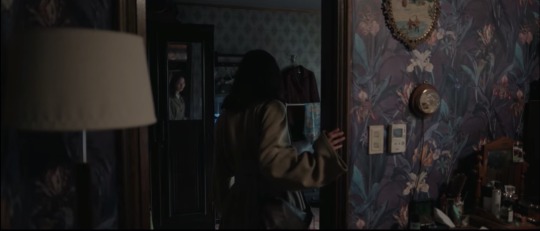
the wallpaper in Hwa-young’s apartment (excellent mirror-threshold blocking, by the way)…
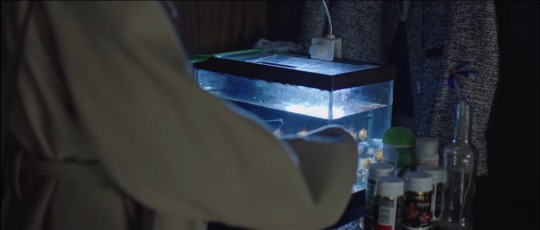
a blue orchid beside her fishtank…
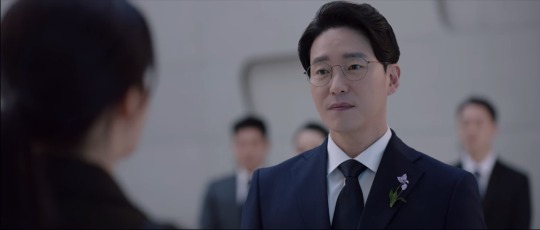
and a blue orchid brooch on the suit of Park Jae-sang (played by Um Ki-joon). Yikes… Personally, I think orchids are also an appropriate motif in a tight environment of power and wealth. Orchids are expensive and requires a lot of precise care.
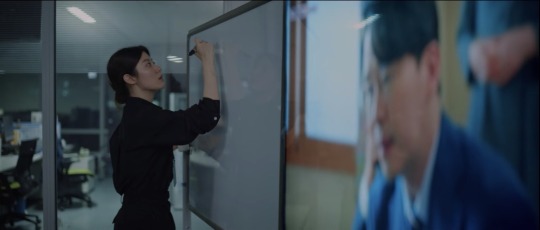
I cannot wait for the sisters to tie up the associations together. The context surrounding Hwa-young’s death becomes even more sinister in light of In-kyung’s investigation on the four money-related suicides from the Bobae Savings Bank Case.
Finally, what will In-joo do with the money that landed on her via yoga locker? Director Shin Hyeon-Min is after the slush fund, and it seems In-joo is in it now, too. Not to mention, she signed an account opening form for Hwa-young, so it seems like the money in the bag is not all there is to it.
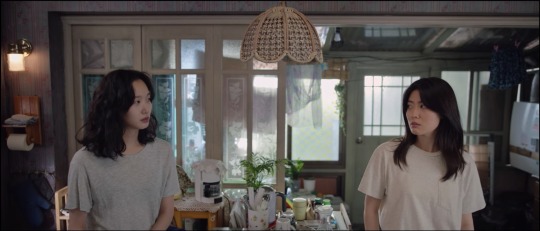
0 notes
Text
BSD Ch.45 “Fix-it, Master Craft” Analysis of references to The Great Gatsby
As someone who has read F. Scott Fitzgerald’s The Great Gatsby for a literature class, Chapter 45 of the manga is one of my favorites, as it’s full of references to the themes and symbols of the book. An unrelated fun fact I’d like to share as well is that the real life Fitzgerald dedicated The Great Gatsby to his wife, whose name was indeed Zelda!
Spoiler Alert! This post talks about events and characters in both Chapter 45 of the BSD Manga, and the book The Great Gatsby by F. Scott Fitzgerald.
Firstly, let’s do a quick summary of the events of Chapter 45, which picks up right after the conclusion of Chapter 44, where Alcott has reunited with Fitzgerald, and has volunteered to help him rebuild his fortune so that he can ultimately acquire The Book.
Following the strategy Alcott devises, Fitzgerald approaches Dr. T.J. Eckleburg, an engineer who works for a security company, who has been accused of murdering a coworker while under the influence of alcohol. Ironically, he was caught by the security system that he himself had engineered, dubbed the Eyes of God. Fitzgerald interrupts T.J. Eckleburg’s suicide attempt, and offers to acquit him, regardless of whether or not he is actually guilty.

credit by dazaiscans
Next, Fitzgerald approaches the CEO of the security company, named Tom Buchanan, and makes the same offer. However, Buchanan refuses. Meanwhile, Ranpo exposes Buchanan as the true culprit of the murder. Fast forward to T.J. Eckleburg’s trial, Fitzgerald confronts Buchanan with this information, and asks for money in exchange for his silence on the matter. Unsurprisingly, Buchanan agrees, and the two have a little villain solidarity moment together.

However! Fitzgerald bursts into the courtroom with both the signed check from Buchanan, and a recording of their conversation. He then reveals that his true plan involved complicated machinations with stocks and the jury, which TL;DR ultimately Fitzgerald ended up as the owner of the security company, and with the Eyes of God in his possession. Bonus! T.J. Eckleburg’s innocence is proven as well, and he now works at Fitzgerald’s security company.
Dr. T.J. Eckleburg and the Eyes of God
In The Great Gatsby, the name Dr. T.J. Eckleburg was indeed mentioned, however, he (or rather, it) was not a human being, but a billboard advertisement. A really creepy billboard, in fact, depicting one pair of eyes smack dab in the center. Throughout the book, various characters talk about how T.J. Eckleburg watches them, particularly when they’re doing something unethical. Dr. T.J. Eckleburg is symbolic of the literal eyes of god in The Great Gatsby.
In Bungou Stray Dogs, this is cleverly referenced in how T.J. Eckleburg is a real person, who invented a security system called the Eyes of God. Moreover, the concept that the Eyes of God is infallible or omnipotent—this is also something that subtly references the symbolism in The Great Gatsby.

Tom Buchanan is a Horrible Person
You may be wondering why so many characters in this chapter have western names, despite being located in Japan. This applies to Tom Buchanan too, who also is named after someone from The Great Gatsby. I don’t actually have much to say here, Tom is a horrible guy in both Bungou Stray Dogs and Fitzgerald’s writing, arguably the least sympathetic asshole in the book, which is a pretty high bar to clear, because everyone in The Great Gatsby is a horrible person in some way or form. Which brings us to our next point:
Morality vs. Money
One of the recurring motifs in The Great Gatsby is that pretty much everyone is selfish, conniving, and has probably committed a crime at some point. Especially for the sake of climbing into a higher social class by using a method to unlawfully get rich somehow. This motif is also applied briefly to Chapter 45, where we see Fitzgerald flaunting his incredibly garbage morals at everyone!


It’s good to know he’s self aware! We see a lot of petty crime and corruption going on in this chapter, from pretty much everyone! Fitzgerald running around and tricking people into giving him money and assets. Alcott’s objectively underhanded and dishonest method of procuring Ranpo’s help. Tom Buchanan commiting a murder and framing his subordinate. The Jury almost giving T.J. Eckleburg a guilty sentence despite his innocence.
Ultimately, T.J. Eckleburg echoes a parallel to a sentiment that was prominent throughout The Great Gatsby.

In the end, one of the major takeaways from The Great Gatsby was how the rigid classism and unfairness of society works. According to the “American Dream”, hard work and perseverance is rewarded. Fitzgerald challenges this belief, writing a story that ended with three of the lower class characters dead, and the characters who were of elite status got off (more or less) scott free.
However, it should be noted that Chapter 45 ends on a much more positive note. Dr. T.J. Eckleburg is proven innocent, Tom Buchanan ends up on the streets, and Fitzgerald emerges from the entire ordeal richer and more powerful, while retaining his newfound shopping sense. This could be Asagiri’s way of showing how Fitzgerald has changed as a character—a direct contradiction to the final line and takeaway of The Great Gatsby:
“So we beat on, boats against the current, borne back ceaselessly into the past.” — F. Scott Fitzgerald
The events of Chapter 45 reflect the themes and symbols in The Great Gatsby, (while also using names and epithets from the book as well) with the sole exception of the concept that people are unchanging, which Asagiri cleverly contradicts through both Fitzgerald’s own character arc moving forward, and concluding the chapter on a positive note for the protagonists.
41 notes
·
View notes
Note
What draws you to incest ?

*sighs* Ok, here we go. I'm a real card carrying Jonsa now aren't I?
Anon, listen. I know this is an anti question that gets bandied about a lot, aimed at provoking, etc, when we all know no Jonsa is out here being all you know what, it really is the incest, and the incest alone, that draws me in. I mean, come on now. Grow up.
If I was "drawn" to incest I'd be a fan of Cersei x Jaime, Lucrezia x Cesare, hell Oedipus x Jocasta etc... but I haven't displayed any interest in them now, have I? So, huh, it can't be that.
Frankly, it's a derivitive question that is really missing the mark. I'm not "drawn" to it, though yeah, it is an unavoidable element of Jonsa. The real question you should be asking though, is what draws GRRM to it? Because he obviously is drawn to it, specifically what is termed the "incest motif" in academic and literary scholarship. That is a far more worthwhile avenue of thinking and questioning, compared with asking me. Luckily for you though anon, I sort of anticipated getting this kind of question so had something in my drafts on standby...
You really don't have to look far, or that deeply, to be hit over the head by the connection between GRRM's literary influences and the incest motif. I mean, let's start with the big cheese himself, Tolkein:
Tolkein + Quenta Silmarillion
We know for definite that GRRM has been influenced by Tolkein, and in The Silmarillion you notably have a case of unintentional incest in Quenta Silmarillion, where Túrin Turambar, under the power of a curse, unwittingly murders his friend, as well as marries and impregnates his sister, Nienor Níniel, who herself had lost her memory due to an enchantment.
Mr Tolkein, "what draws you to incest?"
Old Norse + Völsunga saga
Tolkein, as a professor of Anglo-Saxon, was hugely influenced by Old English and Old Norse literature. The story of the ring Andvaranaut, told in Völsunga saga, is strongly thought to have been a key influence behind The Lord of the Rings. Also featured within this legendary saga is the relationship between the twins Signy and Sigmund — at one point in the saga, Signy tricks her brother into sleeping with her, which produces a son, Sinfjotli, of pure Völsung blood, raised with the singular purpose of enacting vengence.
Anonymous Norse saga writer, "what draws you to incest?"
Medieval Literature as a whole
A lot is made of how "true" to the storied past ASOIAF is, how reflective it is of medieval society (and earlier), its power structures, its ideals and martial values etc. ASOIAF, however, is not attempting historical accuracy, and should not be read as such. Yet it is clearly drawing from a version of the past, as depicted in medieval romances and pre-Christian mythology for instance, as well as dusty tomes on warfare strategy. As noted by Elizabeth Archibald in her article Incest in Medieval Literature and Society (1989):
Of course the Middle Ages inherited and retold a number of incest stories from the classical world. Through Statius they knew Oedipus, through Ovid they knew the stories of Canace, Byblis, Myrrha and Phaedra. All these stories end more or less tragically: the main characters either die or suffer metamorphosis. Medieval readers also knew the classical tradition of incest as a polemical accusation,* for instance the charges against Caligula and Nero. – p. 2
The word "polemic" is connected to controversy, to debate and dispute, therefore these classical texts were exploring the incest motif in order to create discussion on a controversial topic. In a way, your question of "what draws you to incest?" has a whiff of polemical accusation to it, but as I stated, you're missing the bigger question.
Moving back to the Middle Ages, however, it is interesting that we do see a trend of more incest stories appearing within new narratives between the 11th and 13th centuries, according to Archibald:
The texts I am thinking of include the legend of Judas, which makes him commit patricide and then incest before betraying Christ; the legend of Gregorius, product of sibling incest who marries his own mother, but after years of rigorous penance finally becomes a much respected pope; the legend of St Albanus, product of father-daughter incest, who marries his mother, does penance with both his parents but kills them when they relapse into sin, and after further penance dies a holy man; the exemplary stories about women who sleep with their sons, and bear children (whom they sometimes kill), but refuse to confess until the Virgin intervenes to save them; the legends of the incestuous begetting of Roland by Charlemagne and of Mordred by Arthur; and finally the Incestuous Father romances about calumniated wives, which resemble Chaucer's Man of Law's Tale except that the heroine's adventures begin when she runs away from home to escape her father's unwelcome advances. – p. 2
I mean... that last bit sounds eerily quite close to what we have going on with Petyr Baelish and Sansa Stark. But I digress. What I'm trying to say is that from a medieval and classical standpoint... GRRM is not unique in his exploration of the incest motif, far from it.
Sophocles, Ovid, Hartmann von Aue, Thomas Malory, etc., "what draws you to incest?"
Faulkner + The Sound and the Fury, and more!
Moving on to more modern influences though, when talking about the writing ethos at the heart of his work, GRRM has famously quoted William Faulker:
His mantra has always been William Faulkner’s comment in his Nobel prize acceptance speech, that only the “human heart in conflict with itself… is worth writing about”. [source]
I’ve never read any Faulker, so I did just a quick search on “Faulkner and incest” and I pulled up this article on JSTOR, called Faulkner and the Politics of Incest (1998). Apparently, Faulkner explores the incest motif in at least five novels, therefore it was enough of a distinctive theme in his work to warrant academic analysis. In this journal article, Karl F. Zender notes that:
[...] incest for Faulkner always remains tragic [...] – p. 746
Ah, we can see a bit of running theme here, can't we? But obviously, GRRM (one would hope) doesn’t just appreciate Faulkner’s writing for his extensive exploration of incest. This quote possibly sums up the potential artistic crossover between the two:
Beyond each level of achieved empathy in Faulkner's fiction stands a further level of exclusion and marginalization. – pp. 759–60
To me, the above parallels somewhat GRRM’s own interest in outcasts, in personal struggle (which incest also fits into):
I am attracted to bastards, cripples and broken things as is reflected in the book. Outcasts, second-class citizens for whatever reason. There’s more drama in characters like that, more to struggle with. [source]
Interestingly, however, this essay on Faulkner also connects his interest in the incest motif with the romantic poets, such as Percy Bysshe Shelley and Lord Byron:
As Peter Thorslev says in an important study of romantic representations of incest, " [p]arent-child incest is universally condemned in Romantic literature...; sibling incest, on the other hand, is invariably made sympathetic, is sometimes exonerated, and, in Byron's and Shelley's works, is definitely idealized.” – p. 741
Faulkner, "what draws you to incest?" ... I mean, that article gives some good explanations, actually.
Lord Byron, Manfred + The Bride of Abydos
Which brings us onto GRRM interest in the Romantics:
I was always intensely Romantic, even when I was too young to understand what that meant. But Romanticism has its dark side, as any Romantic soon discovers... which is where the melancholy comes in, I suppose. I don't know if this is a matter of artistic influences so much as it is of temperament. But there's always been something in a twilight that moves me, and a sunset speaks to me in a way that no sunrise ever has. [source]
I'm already in the process of writing a long meta about the influence of Lord Byron in ASOIAF, specifically examining this quote by GRRM:
The character I’m probably most like in real life is Samwell Tarly. Good old Sam. And the character I’d want to be? Well who wouldn’t want to be Jon Snow — the brooding, Byronic, romantic hero whom all the girls love. Theon [Greyjoy] is the one I’d fear becoming. Theon wants to be Jon Snow, but he can’t do it. He keeps making the wrong decisions. He keeps giving into his own selfish, worst impulses. [source]
Lord Byron, "what draws you to—", oh, um, right. Nevermind.
I'm not going to repeat myself here, but it's worth noting that there is a clear through line between GRRM and the Romantic writers, besides perhaps melancholic "temperament"... and it's incest.
But look, is choosing to explore the incest motif...well, a choice? Yeah, and an uncomfortable one at that, but it’s obvious that that is what GRRM is doing. I think it’s frankly a bit naive of some people to argue that GRRM would never do Jonsa because it’s pseudo-incest and therefore morally repugnant, no ifs, no buts. I’m sorry, as icky as it may be to our modern eyes, GRRM has set the president for it in his writing with the Targaryens and the Lannister twins.
The difference with them is that they knowingly commit incest, basing it in their own sense of exceptionalism, and there are/will be bad consequences — this arguably parallels the medieval narratives in which incest always ends badly, unless some kind of real penance is involved. For Jon and Sansa, however, the Jonsa argument is that they will choose not to commit incest, despite a confused attraction, and then will be rewarded in the narrative through the parentage reveal, a la Byron’s The Bride of Abydos. The Targaryens and Lannisters, in several ways excluding the incest (geez the amount of times I’ve written incest in this post), are foils for the Starks, and in particular, Jon and Sansa. Exploring the incest motif has been on the cards since the very beginning — just look at that infamous "original" outline — regardless of whether we personally consider that an interesting writing choice, or a morally inexcusable one.
Word of advice, or rather, warning... don't think you can catch me out with these kinds of questions. I have access to a university database, so if I feel like procrastinating my real academic work, I can and will pull out highly researched articles to school you, lmao.
But you know, thanks for the ask anyway, I guess.
#cappy's thoughts#I'm still on my break/hiatus#i just had some of this already written#jonsa#jon x sansa#anti bs#grrm and medieval literature#grrm and william faulkner#grrm and the romantics#grrm and tolkein#grrm and old norse literature#grrm and his literary influences#was this petty lmao?
184 notes
·
View notes
Text
Vanitas no carte: A case study of the vanitas motif?
In this I want to examine how the vanitas motif is used in the manga “Vanitas no carte”. In other words: Is the main character just called Vanitas because it’s a cool name or is the manga embedded within a certain literary/artistic/cultural tradition? And is the connection to that tradition just the name of the main character (spoiler: it isn’t, at least in my option) or is the vanitas motif deeply interwoven within the narrative and its themes (spoiler: it is, at least in my option)?
Talking about spoilers: I have only read up to chapter 40, so this may be updated as I continue reading. On the other hand, there will be spoilers for the chapters up to chapter 40.
Note: I don’t know if something like this has been done before. If it has, I’m very sorry. This is actually my second step into the actual fandom and I’m lacking an overview. Also English is not my native language and it’s hard for me to articulate myself properly. I’m sorry if the topic of the vanitas motif within the manga has been discussed before and I’m sorry for any mistakes I make.
So what is vanitas as a motif?
“Vanitas” is latin for “vanity”. As a theme in literature it addresses the transience of all being.
These works of art associates with the vanitas motif show the futility of pleasure, and the certainty of death. Symbols of wealth and symbols of death are often arranged in a contrasting matter. Similar to “memento mori” (latin for “remember that you [have to] die”. Memento mori is a vanitas symbol itself and they are overlapping), it accentuates the inevitably of death. But instead of the death itself it emphasizes the vanity and transiency of the human life. Motifs connected to vanitas became especially popular during the baroque period due to religious and social upheavals and the experience of the Thirty Years' War (1618-1648) and several plague pandemics and the steady presence of destruction and death. On the other hand, social injustice rose due to the build of expensive castles by absolutist rulers.
The vanitas-motif not only criticizes the worldly glory and pleasure that is transient in nature. But vanitas also accentuated that the humans are powerlessly confronted with their own fate and have no control over their own life. This mindset originated in the traditional Christian belief that earthly pursuits and goods were believed to be transient and worthless. Furthermore, people would be expected to accept their fate that would be inflicted by God. While everything earthly would be eventually in vain, God would be eternal.
The paintings under the term “vanitas still lifes” are the most well-known incarnation of the vanitas motif, but it has been also incorporated as a motif not only in painting, but in poetry (for example in the works of the German baroque poet Andreas Gryphius. And I kid you not, he wrote an ode called “Vanitas! Vanitatum Vanitas!”) and other forms of literature. Within the vanitas motif developed a whole collection of symbols associated with it. These are also presented in this manga.
Vanitas symbols in Vanitas no Carte
Hourglass
The hourglass that takes form in Vanitas’ earring is a classical symbol of vanitas. The flowing sand symbolizes the passing of lifetime and mortality. A symbol of the passing of time and the eventual death is also expressed in the gearwheel ornaments on the “Book of Vanitas”.
Skull
The cover of the first volume shows Vanitas in front of a picture frame made of golden skulls. Skulls are symbols of vanitas and memento mori. They are reminder of death and human transience. One of the skulls on the cover is wearing with a crown, which alludes to the typical form of presentation of the vanitas motif, to juxtapose symbols of death and symbols of wealth and worldly power. This relates to the role of the vampire Queen Faustina, who is both in reign of the vampires but who also seemingly spreads death over them by spreading the curse as Naenia (a name also connected to death, as Naenia was a funeral deity in ancient Rome. The name Faustina on the other hand…is a whole new topic for another day and is most likely referring to Goethe’s Faust, a play that revolves around a scholar who makes a contract with the devil. Actually the act of vampires exposing their real name includes elements of/refers to the Faustian pact motif).
Book
The book itself also a symbol of vanitas and finds its place in the story in form of the…”Book of Vanitas”. Books (among measurement tools and the like) within the vanitas motif represent the emptiness and vanity of earthly knowledge and striving. Subsequently they symbolize the haughtiness that can arise out of thirst for knowledge. From this perspective this symbolism is also tied to Dr. Moreau, who horribly abused Vanitas and other children in experiments to gain scientific knowledge in order to become a vampire himself...and his eventual failure.
Knife
Another part of Vanitas as a character is also connected to the vanitas motif – his knife. The knife stands for the vulnerability of the human life and also functions as a death symbol. The knife is especially charged symbolically as Vanitas attacks Noé on the rooftop, declaring their cooperation has ended at this point. Vanitas is refusing to let another person in his life, refusing to trust someone else but himself. His attack towards Noé with his knife not only is an attempt to make Noé hate him, but also a symbolic “cut” of their ties. But the symbolism doesn’t end here, as Noé is the one who stops the knife with his hand. Showing that he will refuse their ties to be cut. Showing that he will stay at Vanitas side no matter what and that he accepts him and doesn’t want him to be alone. In a second situation where their relationship is on the verge of breaking is the conflict within the catacombs, as Noé refuses to agree with Vanitas idea of fighting back Laurent. Vanitas lashes out, severly insults Noé and tells him to leave, if he doesn’t agree. But Noé stays at his side (and still shows him that he doesn’t agree). One could conclude that Noé’s relationship with Vanitas has an element of transience in it by Vanitas coping mechanism of avoiding and leaving others in case of conflict. And Noé fights this transience of their relationship by offering Vanitas trust, acceptation and in the end stability. During their next conflict, where Noé spits out that he wants to drink Vanitas’ blood, Vanitas leaves. But this time it is Vanitas himself who initiates remediation, who fights his own transience when it comes to social relationships. He returns (which is unlikely to him, as Dante states), his care for Noé are stronger than his desire to be fleeting, not being able to be “caught” by anyone. And sees Noé waiting for him. Again, offering stability.
Mirror
The vanitas motif is not only imbedded in the accessory of Vanitas himself. It also finds its place in the design of Noé, more precisely in the small mirror attached to his tophat. In the context of the vanitas motif, mirrors symbolize vanity and the evanescence of earthly beauty. It also stands for pride and haughtiness, similar to the Greek myth of Narcissus. This actually contrasts Noé’s humble personality.
Flowers
Within the manga Paris is described as the “City of flowers”. While flowers can be also a symbol of love and even immortality, their blooming and withering can also be a symbol of death and fleetingness of beauty, especially in the context of baroque symbolism.
Musical instruments
Musical instruments are a sign of transiency as well, as the sound vanishes into nothing as soon as it is articulated. Music is seen as something unique and unrepeatable, and also as something that is transient in its nature. This becomes evident in Cloé’s character arc, as music is her way to manipulate the world formula. Her life is also highly influenced by the transience of her surroundings, while she herself is forced to remain static.
Carpe diem
Latin for “seize the day”. It’s the name of Jeanne’s weapon. “Carpe diem” is an idiom that was especially popular in the baroque era, but it dates back to the roman poet Horace. Along with “memento mori” and “vanitas”, it emphasized the fleetingness of all life. “Carpe diem” emphasizes the call to make use of the day and the time left and to act, despite the eventual transient nature of all afford. The own mortality should be remembered and therefore the day should be seized. This reflects the main characters Vanitas, Noé and Jeanne, who carry on and refuse to give up, despite the external and internal struggles they face.
The color blue
The color blue takes a significant role within the narratives (Vampire!Vanitas being born under the blue moon). While it is not traditionally connected with vanitas itself, the color blue, together with the color black (which are the two dominating colors within human!Vanitas’ character design), is connected to death and melancholy.
The role of the vanitas motif within the narrative
The vanitas motif is embedded both in the form and in the content of the narrative.
The vanitas motif is embedded within in form of the manga as it has an analytic plot structure. This means the story’s conclusion is already presented in the beginning and the rest of the story unfolds how the eventual conclusion happened. This is the case in “Vanitas no carte” as it presents the conclusion, that Vanitas dies in the end within the first chapter and we are actually reading Noé’s memoirs. Therefore it is a constant reminder, that Vanitas will die and nothing that will happen in the story will change that outcome. Everything that happens in the story appears basically unable to change the end. Every positive development is overshadowed by the fact that it is made clear by the narrative since the very beginning that there will be no happy ending for the main characters. This is especially notable in the scene on the rooftop in volume 3, where Noé declares, how he will stay on Vanitas’ side. This scene is followed by an overlying narration of Noé, who says that memories of the beginning awake memories of the end and expressing his regret. In this positive, powerful scene where Vanitas and Noé make up and the themes of human bonds, free will, acceptation of oneself and others and trust really shine…also embeds the eventual tragic end. The omnipresence of death and its fatality and the transience of life and the knowledge that nothing lasts is the essence vanitas motif and it is presented in the mere structure of the manga.
But its not only the structure where the vanitas motif is woven in, but also the story. This shows especially in the character Vampire!Vanitas and in the mere name itself. As Cloe’s case shows: Vampires are pretty much immortal, if not directly killed. On the other hand, it is the curse of Vampire!Vanitas that endangers vampires: Because it gives them back their mortality and the transience of their existence. A transience not brought by an outside force as in the church, that hunts the vampires – but transience within themselves and their very nature. Vampires fear becoming cursed as much as humans fear death – it can always happen, to everyone. It’s not fast, but slow, seemingly unstoppable “decay”. So it is fitting for someone called “Vanitas” to bring transience and the constant reminder of death and fear upon their whole species.
Another factor of the vanitas motif is the inevitable passing of time and the changes this brings – a theme that is deeply tied to several characters arcs, where death and loss and how to deal with both is a major theme (especially when it comes to Vanitas, Noé, Jeanne, but how they relate to each other thematically is worth an analysis itself and I would digress too much). This is especially notable in Cloé’s arc, who is the only vampire in her family and becomes more and more isolated and alienated from her family, who eventually forgets about her. Cloé’s wish to stop the passing of time (and the underlying wish to be happy with her family, to be accepted for what she is), to fight the transience or rather to fight the vanitas manifests in the time loop. The time is reset and tied into a loop – symbolizing not only her being stuck in the past, but also her refusal of a future, since a future meant nothing but being forgotten for her, who sees no other purpose in herself but to execute the will of her family that has long forgotten her.
The concept of vanitas also includes fatalism and the belief that humans don’t have control over their own lifes. This makes Lord Ruthven , who uses curses to bind other vampires to his will and eliminating their own (as he did/tried to do with Noé, Jeanne and Cloé) a fitting villain from a thematic viewpoint as he impersonates fatalism. Personal choices or free will don’t matter for him as he erases both. This makes him a foil for Vanitas and an antagonist not only in actions but in world view. To Vanitas the freedom of his will and the consciousness of his own choices are extremely important to him. He could never choose in the past and was more seen as tool used by his surroundings than as a person. This emphasis of choices opposes Vanitas to the traditionally fatalistic viewpoint of the vanitas-motif. Not only that, but he uses the Book of Vanitas to actually reverse the curse and fighting the transience of existence that has befallen the vampires.
So Vanitas fights Vampire!Vanitas not only as a person by preventing the curse from killing vampires – but simultaneously he fights the transience and the fatalism: He fights vanitas as a concept itself.
But the narrative doesn’t deem transience not as internally negative. Quite the opposite, the narrative sees transience as an opportunity for change. The change of fixed structures is also an important theme after all. This change of structures is of both negative (as the curse dissembles the true name of the vampire and therefore their entire nature and Jeanne’s struggle and agony with coming in terms with seeing herself changing) and positive qualities. In one of the early chapters Vanitas complains about how the vampires are stuck in the past and therefore refusing his help – it is not only after Vanitas proofs himself that he is at least tolerated. The message of the positive side of change is also within Vanitas’ and Noé’s improving relationship and understanding. Even though Vanitas has a hard time to accept these changes (as he didn’t tell Noé about the state of the Queen, because he thought he wouldn’t believe him and refers to the several past experiences of vampires almost killing him), the positive relationship of both of them even inspires changes in others. Notably Laurent. Who, inspired by seeing a human and a vampire in a positive relationship begins to question his own beliefs and is even on the road to uncover secrets of the church, breaking up entrenched structures as well.
As a conclusion one could say that the manga makes many, many allusions to the vanitas motif and incorporates them structurally, thematically and plot-wise.
Vanitas no Carte is really a case study of vanitas.
78 notes
·
View notes
Text
The Voyage So Far: Alabasta (Part One)
east blue (1 | 2) || alabasta (1 | 2) || skypiea || water 7 || enies lobby || thriller bark || paramount war (1 | 2) || fishman island || punk hazard || dressrosa (1 | 2) || whole cake island || wano (1 | 2)
(this is a repost, i deleted the first version of it by accident cause im Idiot)
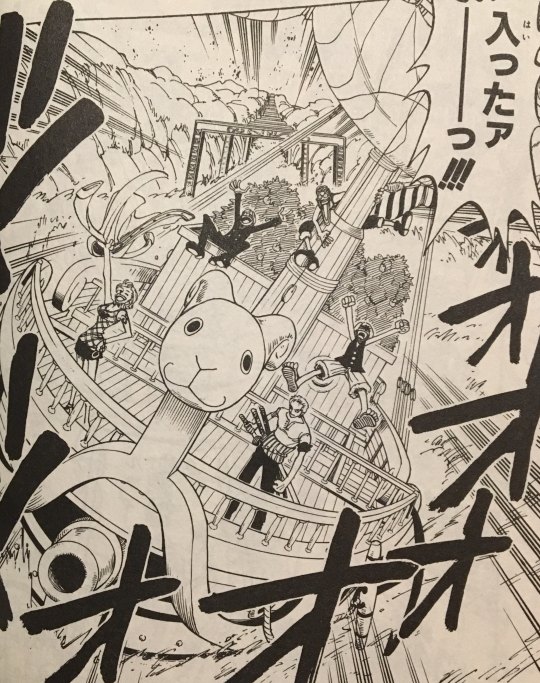
the entry into the grand line is such a great sequence. it feels like such an ending- a triumph after they’ve spent pretty much all of east blue struggling to make it here, and at the same time the beginning of a new adventure, the biggest yet, one that has yet to end a solid two decades later. they all look so happy to have made it here- it makes me smile.
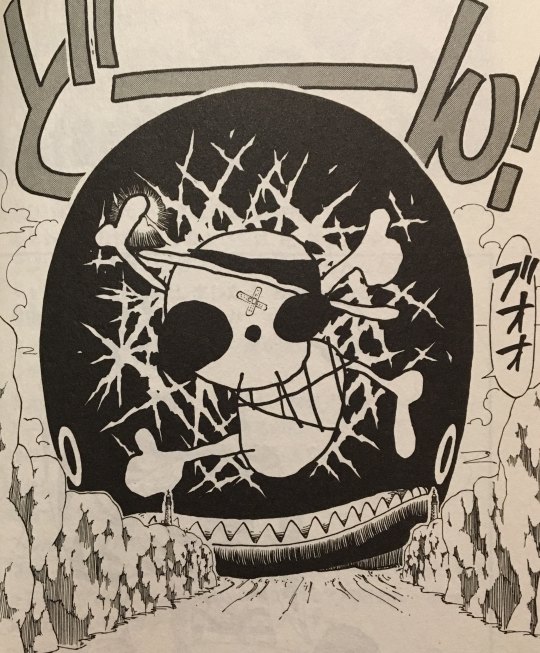
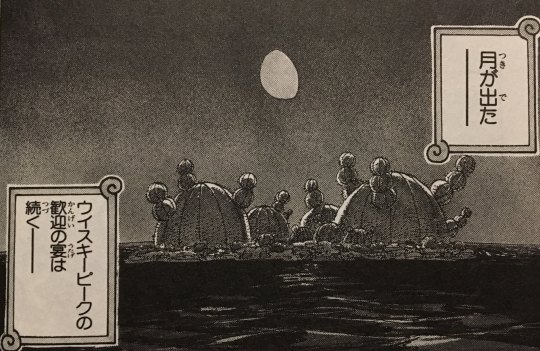
whiskey peak is one of my very favorite short arcs, and i think of the whole first half of the baroque works saga its the one that hits and maintains a tone best (almost certainly because its so short, admittedly, but still). i love the repeated shots of the moon, the reveal that the cactuses are actually covered in graves, the way everything seems far too good to be true at the start and the sense of suspense that creates.
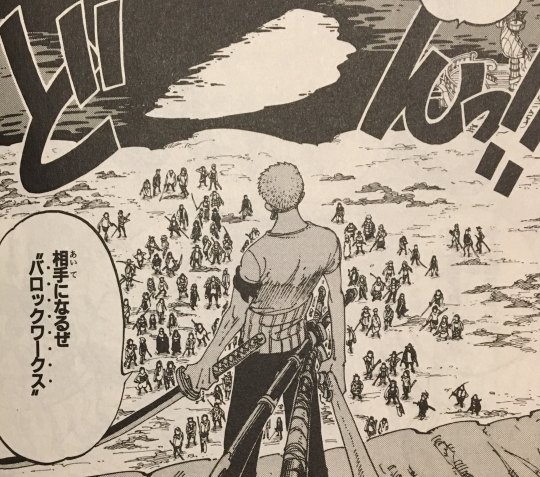
zoro’s extended fight scene in whiskey peak is so great- it’s so creative and so dynamic and the odds are stacked so high against him and yet he’s clearly having so much fun. i do miss this sort of scrappy, improvised fight, cause its largely absent from later one piece but its SO much fun to read- zoro cutting holes in rooftops for people to fall through or shoving ladders to the ground as bounty hunters try to climb them.
i’m a huge fan of fight scenes that use the environment to their fullest, and this is such a perfect example of it. it makes the fight feel a lot more real and exciting, in my opinion.
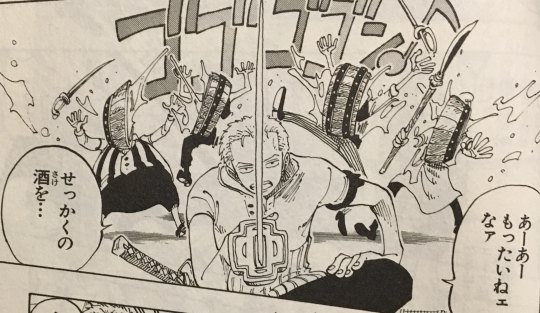
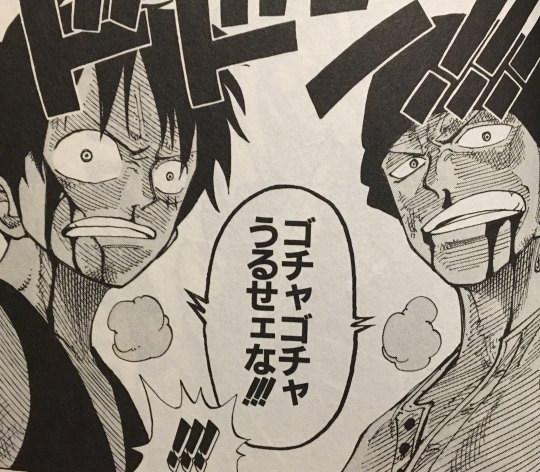
i’ve never liked zoro and luffy fighting at whiskey peak, its always struck me as frustrating and contrived and kind of out of character for both of them, but i will say that i do like how on the same page they are even when they’re trying to kill each other.
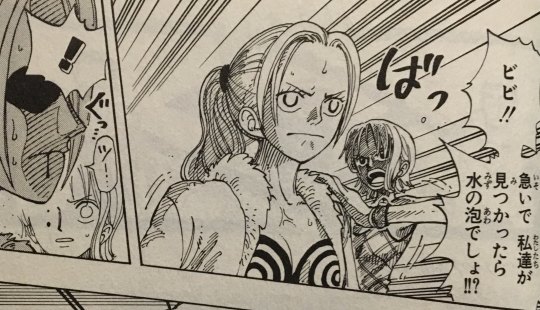
the entire first half of the baroque works saga basically serves to introduce and endear us to vivi so we’ll be invested in the alabasta conflict, and that starts here in whiskey peak, when we get our first glimpse of her actual personality rather than the act she was putting on as miss wednesday, when she bites her lip hard enough to bleed in order not to break down at igaram’s apparent death.
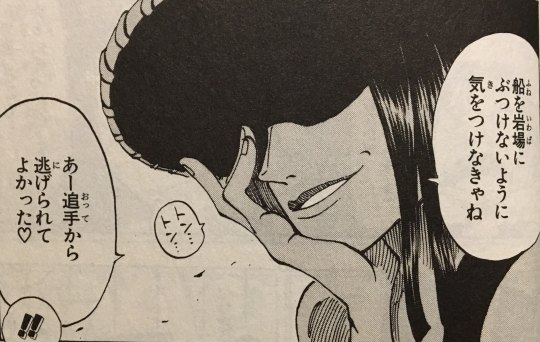
watching robin’s actions with the added context of later one piece is one of the great joys of rereading alabasta. she does a fantastic job of appearing to be crocodile’s most dedicated and capable and dangerous employee while quietly but consistently sabotaging his efforts; saving luffy, sparing pell, sparing igaram, not telling crocodile anything about the strawhats despite meeting them here at the very start of the saga.
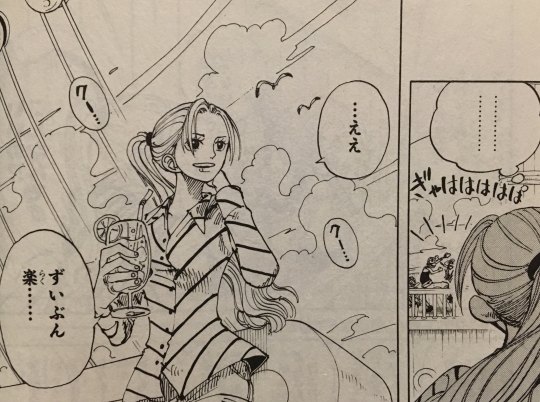
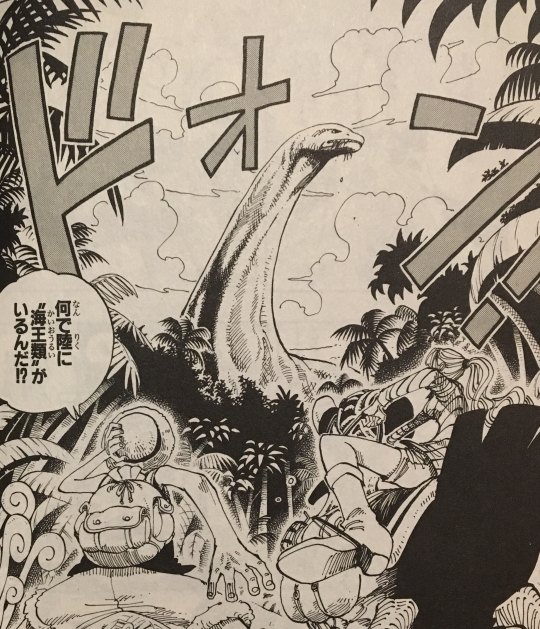
little garden has some really cool and striking panels that really put the scale of things on the island, the dinosaurs and giants alike, into perspective, and i love it.
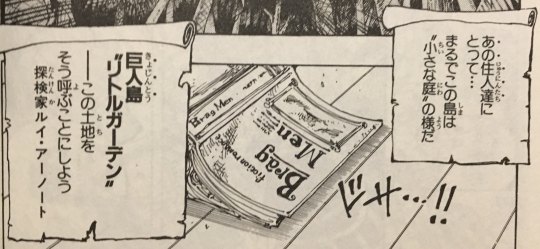
i’m a huge fan of the depth of in-universe lore one piece has. just having little details like this, quotes from books written in-universe, go so far towards making the world feel like a real and wondrous place with mysteries to be solved and details to be uncovered.
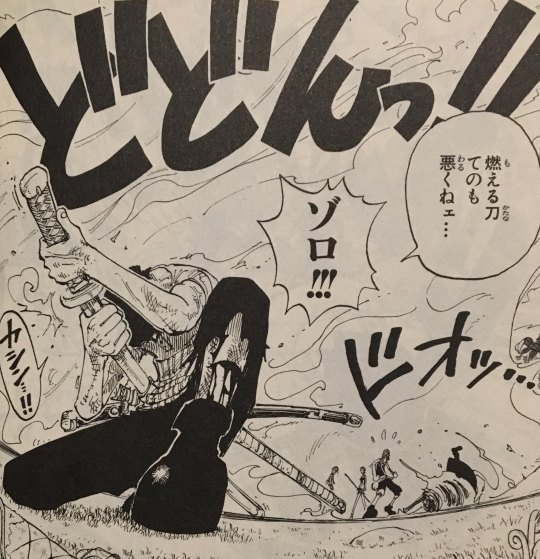
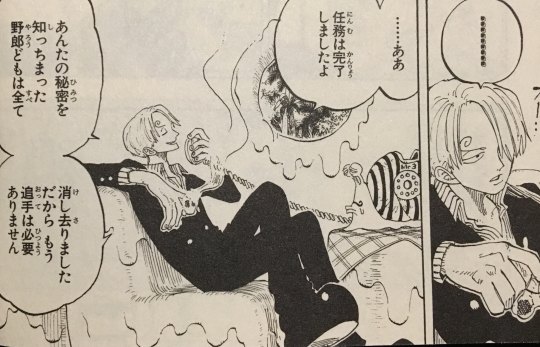
i still think sanji is firmly at his best when he’s being a sneaky bastard, and i will never cease to be delighted by how thoroughly he manages to fuck crocodile over with nothing but a phone and some quick thinking not once but twice.
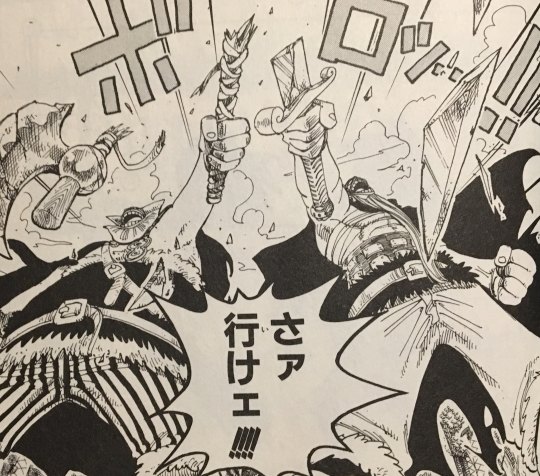
i really like dorry and brogy! for minor characters who’ve only appeared in one relatively minor and inconsequential arc so far, they’re not only very fun and memorable but also leave a hell of an impact on the story, not only in usopp’s new dream of eventually visiting elbaf but also in how they and their crew just keep coming up, first in enies lobby and then even further down the line in dressrosa and whole cake island.
i’m really excited for when we eventually get to reach elbaf, because this plot thread has been so thoroughly and subtly built up over such a long time that i can’t wait to see how it ends.
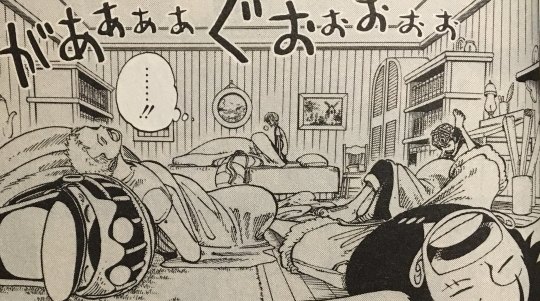
this is one of my favorite little moments to really drive home how much the strawhats care about each other. they all fell asleep on the floor rather than leave nami alone.
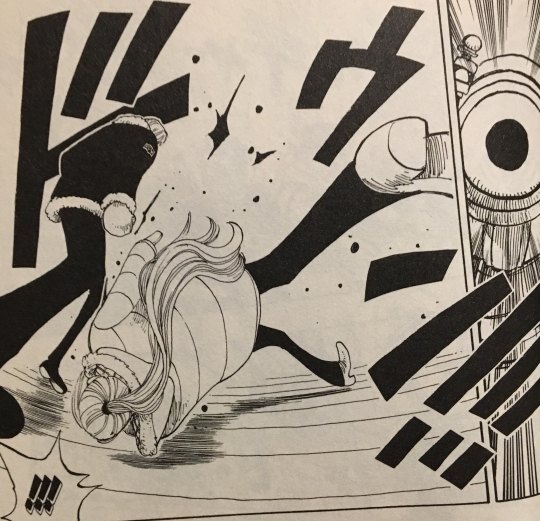
the whole introductory scene to drum is a really good summary of who vivi is as a person and how she contrasts with luffy, and it’s something i’ve written extensively about in a past meta. here ill just settle for saying, vivi is chronically selfless, and always the sort of person to sacrifice herself for others, and these traits which save the strawhats here are the exact same ones that bring her and luffy to blows later on in alabasta.
a good thing to remember when writing characters is that traits aren’t really inherently good or bad, they’re just traits and can have positive or negative consequences depending on the situation, and i think oda is really good at this. vivi’s selflessness, usually a positive thing, becomes reckless self-sacrifice when she’s pushed to her breaking point.
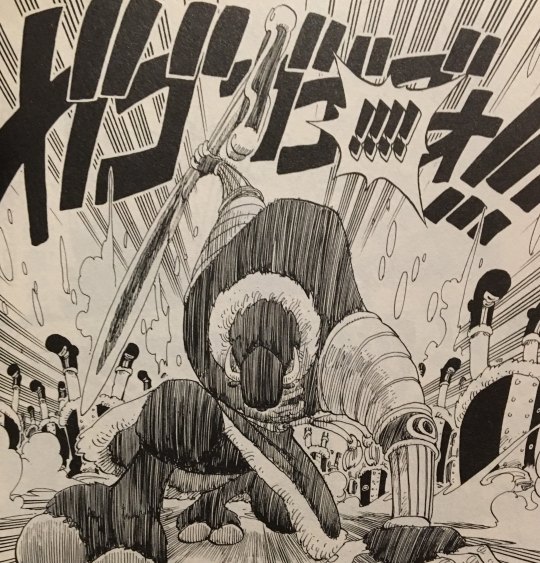
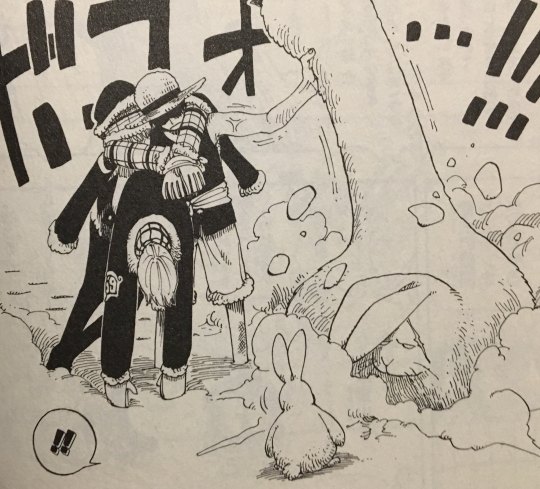
‘kindness begets kindness’ is a pretty consistent theme throughout one piece, though luffy is most often on the other side of it. someone (rebecca, law, tama, etc.) does something for him without really expecting anything in return, and gets paid back a hundred times over. this is a case of the opposite- luffy helps someone offhandedly, and is later saved by their gratitude.
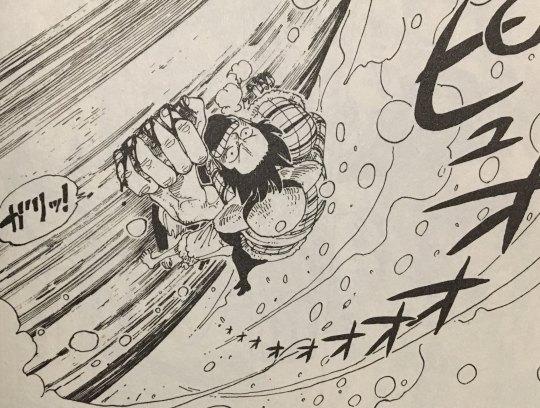
i think luffy wearing his fingers bloody as he climbs the drum rockies is the only time one piece has ever made me cringe back from the page. this sequence is absolutely brutal, and it’s so well-done.
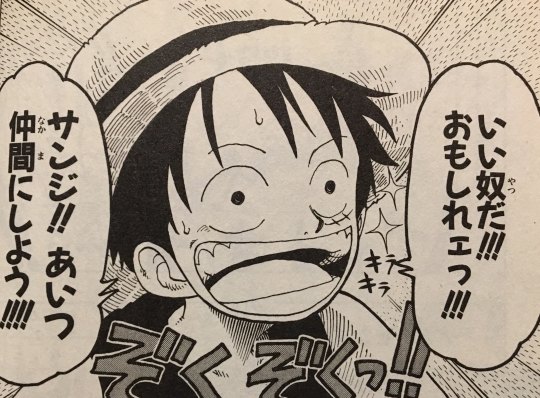
the way luffy decides chopper should be his crewmate is precious, and also reminds me a little of his recruitment of sanji (ironically, given he’s talking to sanji about chopper here). in both cases he sees someone do something good without even really knowing the full extent of their abilities and makes a snap decision that they are awesome and are gonna be part of his crew, no matter what they have to say about it.
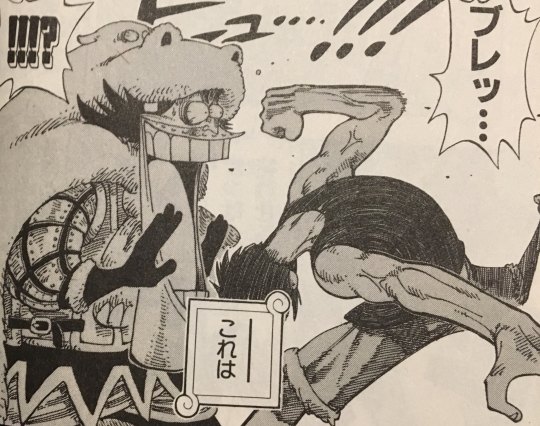
i really, really enjoy the way the drum island flashback is set up, with the cutaway right as luffy is about to punch wapol’s lights out. the cut back to that punch finally hitting when the flashback ends is by that point infinitely more satisfying, since you’ve just read chopper’s backstory and therefore have a deep and abiding desire to see wapol eat shit.
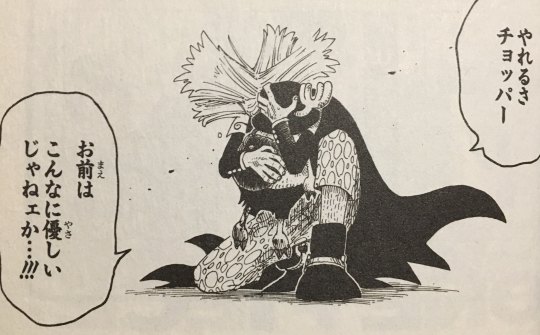
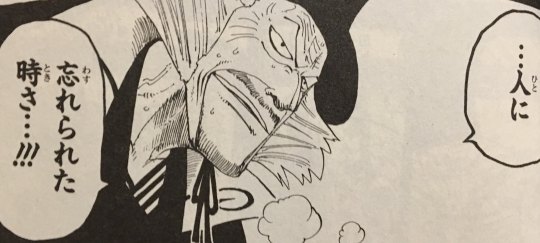
hiriluk’s final speech is definitely one of the best and most memorable quotes from one piece, and effectively the crux of one of its biggest themes. one piece is all about inherited will. all of our main cast and a solid percentage of the supporting cast bear the legacy of at least one forebear on their shoulders, from kuina to corazon to otohime. the entire setting of the story is defined by roger’s legacy.
all those people are dead, but they’re sure as hell not forgotten- how can they be, when their legacies are actively shaping the world as a direct result of their lives and influences?
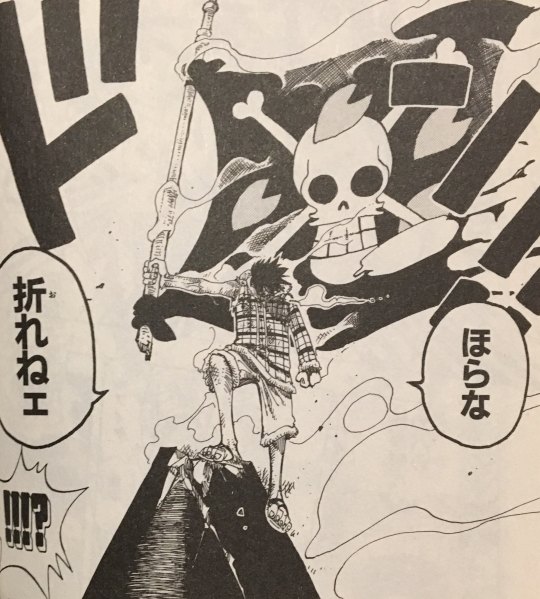
i really, really like the use of flags in one piece. flags are how you declare loyalty or war in equal measure, and flying a pirate flag is a declaration that you’re choosing freedom, come what may, over the laws of the world government. it’s just a really excellent running motif, and a great symbol of what one piece’s definition of piracy means.
this scene is also one of the ones that gets even more extra weight behind it when you know luffy’s full backstory with sabo, which i love.
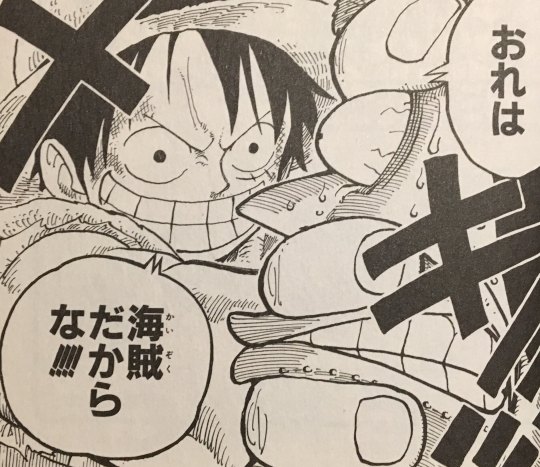
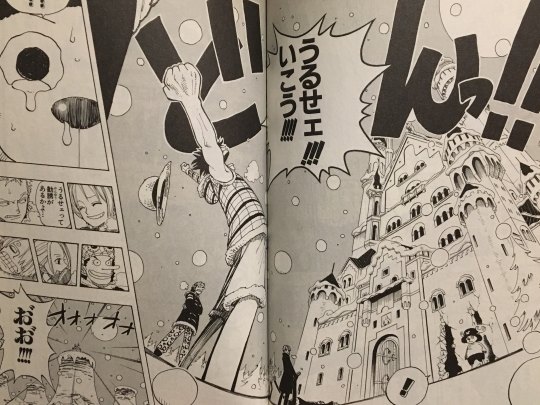
chopper’s recruitment scene sums up one of the reasons luffy is really great. he just doesn’t care about a lot of things other people would normally take notice of. occasionally that gets him in trouble, but other times it leads to him responding to a situation exactly right, like here. chopper is listing off all his insecurities and reasons he can’t go with the strawhats, and luffy just flat doesn’t care. he wants chopper on his crew and he knows chopper wants to be on his crew, so as far as he’s concerned, there’s no issue at all.
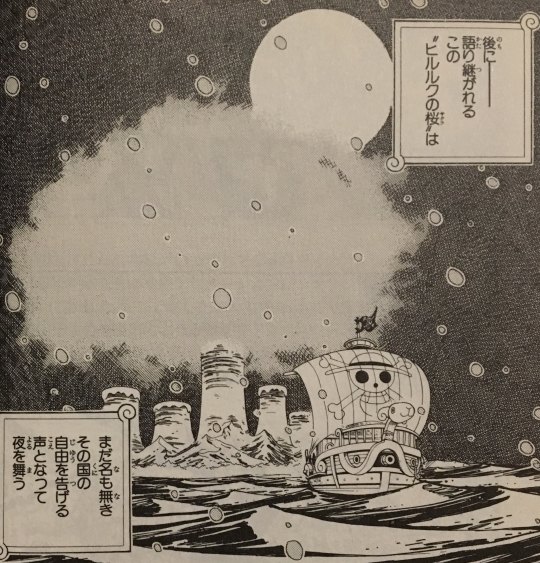
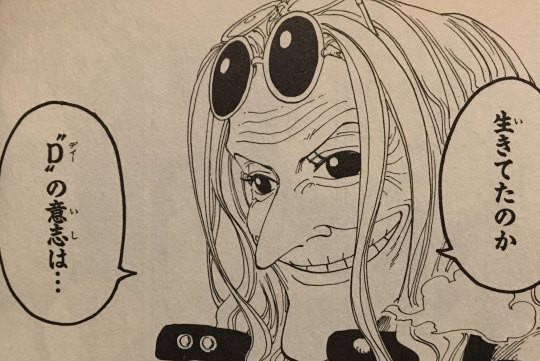
it really is wild that the will of D is named this far back in the story, and has consistently been referenced and built up ever since in very slight ways, through comments by characters like robin and corazon, and yet we still know basically nothing about it.
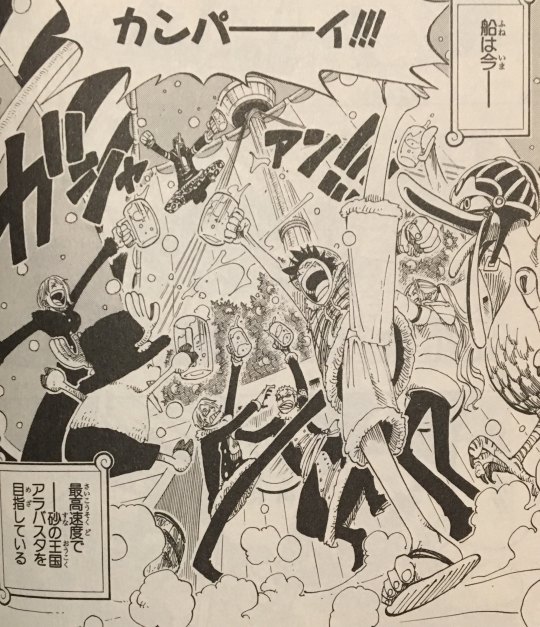
and a toast to a new crewmate!!
continued in the next post, which covers alabasta arc proper.
#the voyage so far#arc: reverse mountain#arc: whiskey peak#arc: little garden#arc: drum island#one piece#opmeta#not japanese#long post
153 notes
·
View notes
Text
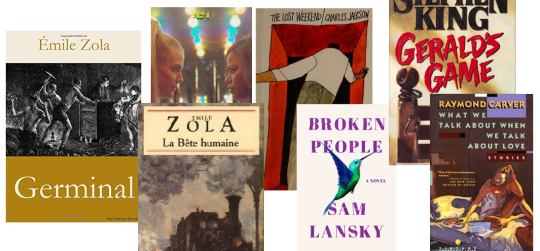
hello join me in thinking about some books and authors that are, or might be, part of s5′s intertextuality
5.10 in particular offered specific shout outs, and also u know i’m always wondering what might be ahead so i have some ideas on that:
- first, as mentioned in a previous ask post, i know i wasn’t alone in keeping an eye out for 5.10 parallels to the lost weekend (1945) the film that gave episode 1.10 its name and several themes - or to the 1944 book by charles r jackson which the film is based on
- s5 has not been shy about revisiting earlier seasons, especially s1. altho i feel that 1.10′s parallels to the lost weekend centered characters other than jughead (mostly betty), a 1.10-5.10 connection involving jughead and themes from jackson’s story (addiction, writers block, self reflection) seemed v possible if not inevitable
- but like,, , for a hot minute after the ep, i was really stumped on understanding how anything from the book or film could apply, even tho the pieces were almost all there
- jackson’s protagonist don birnam goes thru and comes out the other side of a harrowing days-long drinking binge that could be compared to jughead’s one-night hallucinogenic writing retreat
- but jughead is struggling primarily with traumatic memories, not addiction and self control like birnam. and tho drinking activates birnam’s creativity, it paralyzes his writing as he gets lost in fantasies; he’s never published anything. jughead’s drug trip recreates circumstances that already helped him write one successful book. even the rat that startles him mid-high doesn’t line up with birnam’s withdrawal vision of a dying mouse, symbolic of his horror at his own self-destruction thru alcohol
- and maybe the most visible discordance: in the film there’s a romantic motif around a typewriter. first it’s an object of shame; birnam’s failure to write, tied up with his drinking, makes him flee his relationship. he tries to pawn the typewriter for booze money and finally a gun when shooting himself feels easier than getting sober. but with the help of relentless encouragement from girlfriend helen, he quits drinking, commits to her, and focuses on typing out the story he’s dreamt of writing. rd goes so far to avoid setting any comparable scenario that jughead has brought a wholeass printer into the bunker so there can still be a physical manuscript to cover in blood by the end, even without his own typewriter. the subtle detail of his laptop bg image is a little less noticeable than his avoidance of betty’s gift
- tabitha might be closer to a parallel than jughead is, but she’s still no helen. both refuse to take advantage of the inebriated men in their care, but birnam takes advantage of helen, financially and emotionally. jughead refused a loan from the tate family and now has resolved to deal with his shit before he considers a relationship with tabitha. instead of helen’s relentless and unwelcomed attempts to get birnam sober, tabitha reluctantly agrees to help jughead trip safely bondage escape notwithstanding. she even helps him get the drugs.
- whatever potentials exist for parallels to jackson’s story, they were not explored for this episode. ok so why tf am i even talking about this? what was there instead?
- i have arrived at the point
- s5 has been revisiting s1, not directly but with a twist. and jughead’s agent samm pansky is back. u may recall, pansky is named for sam lansky
- jughead’s trip-thru-trauma is a story device tapped straight from lansky’s book ‘broken people’
- lansky is like if a millenial john rechy wrote extremely LA-flavored meta but just about himself no jk very like a modern successor to charles r jackson. both play with the boundary between memoir and fiction. lansky is gay; jackson wrote his lost weekend counterpart as closeted and remained closeted himself until only a few years before his death. both write with emotional clarity and self-scrutiny on the experiences of addiction, sobriety, and the surrounding issues of shame and self worth
- i feel like a fool bc after this ep i had been thinking about de quincey and his early writings on addiction (c.1800s), but i failed to carry the thought in the other direction, to contemporary writers in the genre, to make this connection sooner
- lansky’s second book, broken people, follows narrator ‘sam’, mid-20s, super depressed, hastled by his agent to write a decent follow-up to his first book, but too busy struggling with his self-worth and baggage from several past relationships. desperate, he takes up an offer to visit a new age shaman who promises to fix everything wrong with him in a matter of days. not to over simplify it but he literally spends a weekend doing psychedelics and hallucinating about his exes. jughead took note
- unless u want me to hurl myself into yet another dissertation about queer jughead, i think his parallel to sam - who, unlike jughead, has considerable financial privilege and whose anxieties center on body dysmorphia, hiv scares, and his own self-centeredness - pretty much ends there
- But,, the gist of the book could not be more harmonius with a major theme shared by the 2 films that inform the actual hallucination part of jughead’s bunker scene: mentally reframing past relationships to get closure + confronting trauma head-on in order to move forward
- so that’s neat. what other book and author stuff was in 5.10?
- stephen king and raymond carver get name dropped. i’m passingly familiar with them both but u bet i just skimmed their wiki bios in case anything relevant jumped out
- like jughead, carver was a student (later a lecturer) at the iowa writers workshop. also the son of an alcoholic and one himself
- i recall carver’s ‘what we talk about when we talk about love’ is what jughead was reading in 2.14 ‘the hills have eyes’ after he finds out about the first time betty kissed archie (at that time he does not respond as would any of carver’s characters)
- this collection of carver stories deals especially with infidelity, failings of communication, and the complexities and destructiveness of love. to unashamedly quote the resource that is course hero, ‘carver renders love as an experience that is inherently violent bc it produces psychic and emotional wounds.’ very fun to wonder about the significance of this collection within the s2 episode and in jughead’s thoughts. and maybe now in the context of the s5 state of relationships. or, at least, the state of jughead’s writing as seen by his agent
- anyway pansky doesn’t want carver, he wants stephen king
- i have too much to say about gerald’s game in 5.10, that’s getting its own post someday soon
- lol wait king’s wife is named tabitha uhhh king’s wiki reminded me of his childhood experience that possibly inspired his short story ‘the body’ (+1986 movie ‘stand by me’) when he ‘apparently witnessed one of his friends being struck and killed by a train tho he has no memory of the event’
- no mention of that in this rd episode but memories of a train could be interesting to consider with the imagery that intrudes on jughead’s hallucination. i still feel like it was a truck but the lights and sounds he experiences may be a train
- ok now we’re in the speculation part of today’s segment
- if jughead’s traumatic memory involves trains, then it’s possible this plot will take influence from la bête humaine <- this 1938 movie is based on the 1890 novel by french writer émile zola. this story deals with alcoholism and possessive jealousy in relationships, sometimes leading to murder. huh, kind of like carver. zola def comes down on the nature side of the nature-vs-nuture bad seed question (tho i should say he approaches this with great or maybe just v french compassion). also i can’t tell if this is me reaching but, something about la bête humaine reminds me of king’s ‘secret window’ which we’ve observed to be at least a style influence on jughead post time jump
- but wow a late-19th century french writer would be a random thing to drop into this season, right? then again zola also wrote about miners, which we’ve learned are an important part of this town’s history + whatever hiram is up to this time. and most notably, zola wrote ‘j’accuse...!’ an open letter in defense of a soldier falsely accused and unlawfully jailed for treason: alfred dreyfus. archie’s recent army trouble comes to mind.
- since the introduction of old man dreyfuss (plausibly Just a nod to close encounters actor richard dreyfuss, but also when is anything in this show Just one thing) i’ve been wondering if these little things could add up to a season-long reference to zola’s writings. but i had doubts and didn’t want to speak on it too soon bc, u know, it’s weird but is it weird enough for riverdale??
- however,,,
- (come on, u knew where i was going with this)
- a24′s film zola just came out. absolutely no relation to the french writer, it’s not based on a book but an insane and explicit twitter thread by aziah ‘zola’ wells about stripping and? human trafficking?? this feels ripe for rd even outside the potentials here for the lonely highway/missing girls plot.
- that would add up to a combination of homage that feels natural to this show
- anyway pls understand i’m just having fun speculating, most of this is based on nothing more concrete than the torturous mental tendril ras has hooked into my skull pls let go ras pls let go
#accompanying image has no meaningful organization it's just there to make me look insane. enjoy#riverdale speculation#filmref#but books#adhd has me like. this is Not the post i've been trying to write for weeks but my brain gave me no choice
20 notes
·
View notes
Text
Hi, can we discuss how -- however he was influenced by Gaea -- Octavian was likely very familiar with the Triumvirate? It’s subtle, but it shows up most clearly in the way he talks.
(Personally, I think Octavian might have been raised by one of the Imperial Households, but you could just read it as him being in contact with the Triumvirate for a significant amount of time.)
The most glaring red flag imo is that we learn from Rachel (in Hidden Oracle) that the Greek / Roman parley in House of Hades was held on property owned by Nero. This is more important than the fact that Octavian was merely funded by Triumvirate Holdings, because a) it makes an in-person meeting more likely and b) Luke was also funded by the Triumvirate and he doesn’t have the same connection that I’m seeing in Octavian.
Looking back to the parley scene, Octavian goes so far as to mock Rachel by saying, “You’re the Oracle of Delphi? Right. And I’m the Emperor Nero.” It may feel like a throwaway line, but it’s foreshadowing, plain and simple. In universe, I’m almost entirely certain that the reason Octavian says Nero and not Augustus (his namesake, as he loves reminding people) is that he’d recently talked to Nero and knows whose building they’re on. It’s like a Freudian slip -- and it’s just the tip of the iceberg, because Octavian slips up like that a lot.
Let’s start small: Octavian tends to speak in a rather dramatic, formal way. (He says “alas” in ordinary conversation, for instance.) He’s intentionally dramatic and somewhat sarcastic at times, sure, but I think it goes deeper than that. {I bring up one of my headcanons here, but it isn’t the crux of the whole argument. Bear with me.} I find it likely that Octavian learned Latin as his first language -- namely from the fact that his family has been sending kids to Camp Jupiter for over a century and his attachment to the idea of being a true / traditional Roman -- which would have an impact on how he speaks English. It would make sense, then, that his English speech patterns are similar to those of other native Latin speakers -- like the Triumvirate.
Trials of Apollo shows us that the triumvirs also tend to use more formal English, such as avoiding contractions and using what we might consider to be dated terms and phrasings (though this certainly isn’t a hard rule). Again, I don’t think it’s really conscious, but rather a byproduct of being native Latin speakers. In Hidden Oracle, for example, Nero says (to Apollo), “My own forefather does not recognize me?” I’d consider both his use of the word “forefather” and his avoidance of “doesn’t” to be a concise example of what I’m talking about.
It’s also true that few other characters use “alas” like Octavian does. In Heroes of Olympus, it’s only gods / titans / monsters who use the word “alas” (besides Octavian). In Trials of Apollo, it’s actually Apollo himself who uses that word the most (though remember, he’s also the narrator). He says “alas” 5 times in Hidden Oracle and ups it to 12 in Dark Prophecy. Do I need to keep counting? Beyond Apollo’s narration, Macro, Medea, and Caligula all say “alas” at least once in Burning Maze. All of these characters speak ancient languages, and half of them are native Latin speakers. I’ll admit that maybe it isn’t wholly a Latin thing, but there’s still a case for Octavian speaking in a way that could have been influenced by the emperors and their entourages.
Moving a step beyond nitpick, the connection between Octavian and the Triumvirate can also be seen in what Octavian says and the words he uses throughout Heroes of Olympus. We can split the analysis into 3 ideological themes, really: loyal Romans, immortality, and the future.
In Son of Neptune, Octavian calls himself a “loyal Roman” in a conversation with Percy. It’s rhetoric, a succinct yet subtle way to express Octavian’s ideology / self-conception / political striving, and that’s exactly the point. Later, in Blood of Olympus, Michael Kahale criticizes the people that Octavian is recruiting into the legion, calling them murderers, thieves, and traitors. Octavian, on the other hand, calls them “loyal demigods” -- again, fully aware of the rhetoric of that statement. Bryce Lawrence, one of said recruits, calls himself a “loyal Roman” too in order to appeal to Octavian and be permitted to rejoin the legion after his exile.
The reason this recurring “loyal Roman” motif strikes me is that it’s eerily similar ideology and phrasing to something Nero says in Hidden Oracle. Apollo asks, “The other two emperors. Who are they?” and Nero responds, “Good Romans -- men who, like me, have the willpower to do what is needed.” A line from Caligula’s speech before battle in Tyrant’s Tomb echoes the same sentiment: “It’s time to be true Romans!” In Tower of Nero, Nero also talks about bringing back “traditional Roman values”.
Apollo hits the nail on the head with his commentary: “The fact that Nero -- a man who had killed his own mother -- was talking about defending traditional Roman values...that was just about the most Roman thing I could imagine.” The whole point in all of these cases is that the men talking know that the modifiers they use are 100% oratorical, are dog whistles to those who think the same way and near gaslighting to those who don’t. These modifiers -- “loyal”, “good”, “true”, “traditional” -- mean something entirely different to the person saying them than they do to the heroes / average person! That’s a fascinating and complex parallel.
Immortality comes up in similarly echoed ways, showing that Octavian and the Triumvirate seem to be on the same page, coming from the same viewpoint, thinking alike. In Son of Neptune, what Octavian says to Mars is interesting especially in light of the Triumvirate. Mars, explaining the danger posed by the open Doors of Death, asks the gathered legion, “Can you imagine a world in which no one dies -- ever?” Octavian, despite his showy deference, interrupts the god, “But, ah, mighty all-powerful Lord Mars, if we can’t die, isn’t that a good thing? If we can stay alive indefinitely--” Octavian isn’t outright stupid, so I doubt he’s entirely thinking through what he says here. Of course it would be bad for one’s enemies to never die, but if you consider Octavian to be the type to be tempted by immortality? His interruption seems more in character and more likely if he has immortals or even aspirations to immortality in mind at the time.
In Blood of Olympus, Reyna’s vision of the Roman war-camp gives more weight to what I’ll call the immortality hypothesis. She notes Octavian’s “gilded chair that looked suspiciously like a throne”, how his new title of Pontifex Maximus elevates him “almost to the level of emperor”, and of course there’s the altar: “a marble altar....no doubt for the gods. But to Reyna it looked like an altar to Octavian himself.” In Hidden Oracle, it comes up several times -- even from Nero himself -- that the Triumvirate turned the ancient Imperial Cult into something powerful, something that could make them immortal. The Imperial Cult, at its simplest, looked a lot like what Octavian is doing in Reyna’s vision. Whether the Triumvirate told Octavian to do any of this, he got the idea from them, or he came up with it on his own, it’s another sign of similar thinking, at the very least.
Finally, the future -- which, of course, is bound to come up often where an augur is concerned, but I’m thinking of one line in particular. In Blood of Olympus, Octavian tells Michael about his plans, blatantly admitting that he’s aiming to declare himself “First Citizen” like his ancestor Augustus. (That title is princeps in Latin, and it’s an imperial title all three of the triumvirs use.) His Augustan lineage, which makes Octavian a legacy of Apollo from the same bloodline source that both Nero and Caligula get that status from, is another puzzle piece. Octavian is open about his heritage, his family is recognized as wealthy and powerful in New Rome and yet is never present there, and the Triumvirate seems unlikely to lose track of their relatives. Even so, what Octavian tells Michael next is a less speculative tie: “We will rule the future.” This is, specifically, the way Apollo frames the threat posed by the Triumvirate throughout Trials of Apollo once he becomes aware of their plan regarding Python and the oracles. A lot of that description comes after Apollo hears something Nero says to Python: “When we control all four Oracles, we will control fate itself!”
I suppose a facetious TL;DR might be that if you told me that Nero (canonically the best orator in the Greco-Roman Riordanverse) had been giving Octavian (canonically the best orator at Camp Jupiter) lessons in oratory or that Caligula had taken Octavian under his wing and every Tuesday they talked about world domination over coffee, I wouldn’t be surprised in the slightest.
Maybe this post is more of a Rorschach inkblot test for myself and how I read these books. Maybe I’m trying to read way too deeply. Whatever the case, I think that there’s something more to be said about Octavian and the Triumvirate than funding, and no one has been saying it.
#trials of apollo#toa#tower of nero spoilers#heroes of olympus#hoo#hoo octavian#triumvirate holdings#toa nero#toa caligula#toa apollo#I'm not tagging everyone#filodox!#basically this post is my attempt at writing out a vibe / something my intuition picked up on so idk if it really makes sense#or looks entirely crazy#you decide
96 notes
·
View notes
Note
this is kind of controversial so bear with me. as a slavic person i really feel like twn kind of “stole a part of our culture” (no not because there are poc, fuck the people who say that) like, the books and games have a really distinct slavic feel to them, even if they are inspired by europe in general, but twn kind of... throws all that out. it feels like just another western fantasy trying to be the next got. quite a few slavs have been trying to bring this to light but it’s greatly overshadowed by the numerous people simply being racist about the cast. this may seem dumb or like “white people pretending to be oppressed” but. slavs don’t really get the best treatment in western media as is and erasing us from one of our best known franchises kind of really sucks.
no i agree with this. i think the stupid fucking racists that are mad that there are actors of color in the series have totally taken this argument into red flag territory so that now it’s dangerous to broach this topic without attracting those freaks.
the witcher adaptation is not ‘slavic’ because it has no cultural reference to poland or any other parts of the region. both in writing and in visual design, it is incredibly generic and bland, as you said: “another western fantasy trying to be the next game of thrones.” this is disappointing and frustrating.
i’ll speak from my perspective as an american witcher fan: i did not know anything about polish culture/language/etc from my public school and postsecondary education. the only time we ever were taught about the region was in education about world war II and the cold war (in which they don’t teach us anything except that “poland must have been weak because it fell so quickly, and it then was part of the big bad soviet union :( ew communism ew”. the closest thing to poland that we learn about is russia (NOT conflating the two, i’m just saying the closest in proximity/language group/etc), and we learn very negative things about russia. and i live in a “liberal” area of the US.
of course i’m nothing near an expert now, but i have learned more from being in this fandom, mostly because i have looked into the publishing of the books, differences between original text and the english translation(s), cultural references and mythology. and of course i have had way more conversations with mutuals/friends from poland than i ever would have if i had not joined the fandom.
things that highlight the witcher books being “polish/slavic” to me, that weren’t in the netflix series at all: writing, humor, character tropes and mythology, specific foods, specific social groups and distinctions (peasantry vs nobility), governmental offices and organization, pacing.
and it seems like it was scrubbed on purpose to make it more ‘palatable’ to a broader american/british audience. ... which didn’t have to happen at all! a lot of what american audiences found interesting about the witcher (mostly demonstrated through the witcher 3) was its “uniqueness” in that it had a lot of cultural references that weren’t familiar to americans - for example the leshens in tw3 were quite popular because not many american fans had ever heard of them before, they sounded like a totally unique concept.
but they intended to take out the “distinct slavic feel” that you describe, ON PURPOSE:
this can be seen with people like alik sakharov running into conflict with lauren hissrich and the overall writing and visual direction:
The first season of Netflix's The Witcher was incredibly successful, but it did undergo a few changes on its way to the small screen, and that included a shift in directors. Alik Sakharov was originally going to direct episodes 1, 2, 7, and 8 of season 1, but only ended up directing episode 2 in full. Marc Jobst would reshoot significant parts of episode 1 and would take over 7 and 8, and up until now, we didn't really know why he departed. Showrunner Lauren S. Hissrich previously commented on his departure, but we finally heard from Sakharov in a new interview, and he broke down what he thought of his work on season 1 and why he ended up leaving
(...) Sakharov talked about the different points of view regarding the approach and vision for the show, and that conflict was the main reason why he left.
“You see, in my perception, Eastern-European literature has a completely different pace," Sakharov said. "It is no coincidence that Andrzej Sapkowski has so many storylines and characters. The producers set the task of setting the adaptation at an action pace and filling it with colorful special effects. That was their vision. My vision was very different and I tried to convey it to them, giving my arguments. Unfortunately, I was not considered convincing enough, so I decided to leave the project.”
The Witcher Director Explains Why He Left The Show
which is just so fucking annoying and disheartening because it’s part of what makes the witcher... the witcher. one can’t deny that sapkowski was largely influenced by the world around him (for better, or for worse... i’m looking at you, wwii antisemitism analogies with elves and dwarves instead...) and that was all taken out.
but they added so much sensationalist stuff to it - violence where it doesn’t make sense / isn’t necessary (the giant genocide that calanthe apparently carried out?), sex and nudity where it doesn’t make sense / isn’t necessary, all while taking away so much of the original text and dialogue, adding in cheap one-liners instead of paragraphs of emotion. the americanization of the media goes hand-in-hand with making it stupider, so it can reach the broadest possible audience to make the most possible amount of money.
and the effect of this is that all of the new fans coming in from the show don’t know anything about this and treat it like american media. one of the ways where this can be seen most prominently is how the fandom ‘affectionately’ nicknames jaskier “jask” ... and treats “buttercup” like a totally different pet name that geralt can call him... when... that’s not how... grammar and words work...
this is one of the reasons that i unironically like the hexer way more as an adaptation of the witcher books. one can’t deny that they’re more truthful to the original work.
before this i’ve also read a little about how the witcher becoming a big thing (not even reaching the western countries yet) was important because before it, only western fantasies like tolkien were considered to “sell well” by publishers so they wouldn’t take their chances with a polish author. it can’t be denied that the witcher is a cultural phenomenon and gave more international representation to poland just overall and in arts/culture. and the netflix series totally washed this all away in their interpretation.
what makes me mad as well is that they had a great opportunity to use traditional polish folk wear / motifs / art in the costume and set design and visual direction of the whole thing, and they just completely did some random bullshit that looks horrible and grotesque (no one looks like they come from the same planet or time period, much less the same continent). it’s not “fantasy,” it’s just random and nonsensical. extremely disappointing considering how much potential they had to consult polish artists, costume designers, historians and medieval scholars. (the witcher doesn’t take place in medieval europe but it is certainly influenced by it, and imo historical direction in series like this are always good for the art.)
it’s also really fucking annoying that the netflix staff think they’re so progressive and amazing for adding in like 5 characters of color that almost all serve to support or antagonize the main white leads. the netflix series isn’t even good representation for people of color by a long shot imo and yet it’s touted by its showrunner as something extraordinary. why can’t we have people of color involved while also keeping what is considered as polishness or slavicness. it’s entirely possible, but netflix didn’t want to do either of those things because it wouldn’t get them as much money.
50 notes
·
View notes
Text
Sandtion: The Sense and sensibility connection - a meta collab with @and-holly-goes-lightly
As some of you may have gathered, @and-holly-goes-lightly and I are salt mates (this is a tumblr term I have learned only recently and am planning to run into the ground. You have been forwarned. I don’t want any complaints down the line!)
It all started about a year ago, with this:
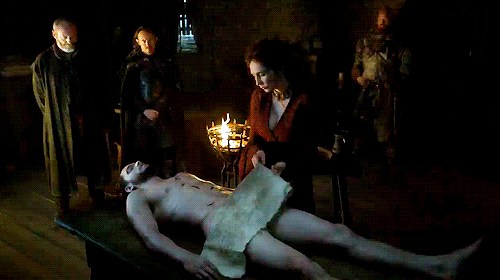
And progressed steadily until we ended up here:

Occasionally, between ogling pictures of naked men, we discuss serious issues as well. Those end up as metas for your consumption, most of the time.
It’s a colaboration that works well. I write long metas, she writes really good ones. We enjoy. We have fun.
Given that we both obssesively analyze tv content and that we tend to reach about the same conclusions, we have been planning on doing some project together for a while now.
I think if 2 months ago someone had told us that Sanditon would be the tv show that would see us join writing forces, we would have been more than a little shocked.
But here we are … hoplessly obssessed with Austen’s unfinished novel and ITV’s unfinished tv show (get the hint, ITV?!?! I hope you do. Chop, chop! You can’t live on Downton Abbey reruns for the rest of time, you know)
So on this most special of days, @and-holly-goes-lightly and I bring you the motherload of Sandtion metas. Two crazy writers, one tv show, one simple title:
Sandtion: The Sense and Sensibility connection
It’s no surprise to anyone, at this point, that Andrew Davies wears his Austen influences on his sleeve in Sanditon. You can find easter eggs for most of Austen’s work, from the famous Pride and Prejudice to the obscure Lady Susan.
However, Sense and Sensibility seems to be one work that hasn’t insipired much comparison from the fandom. And it’s perhaps for that reason that Sandion’s last two episodes were so hard to digest and why so many question marks were raised in regards to Charlotte’s characterization.
In this project we aim to dispel some of that confusion and attempt to put into prespective the character arcs of both Sidney and Charlotte in:
Sidlotte: A parallel journey between Sense and Sensibility by @fortunatelylori
As well as delve deeper into Charlotte’s POV through out the season finale in:
Charlotte Heywood - From Sensibility to Sense by @and-holly-goes-lightly
We hope you enjoy our take. Please don’t forget to leave us your comments in the reply section. This is a new format for us and we’d love to hear from you on how you like this kind of collaborative work.
Sidlotte: A parallel journey between Sense and Sensibility

As I was reading the now infamous Theo James interview, I was reminded of the “unusual” visual representation of Sanditon. It really does look quite different to most Austen adaptations which are defined by the sunny, sanitized domesticity of the English garden.
Sanditon doesn’t look like that. It’s rough and a little wild. It presents a world in the throes of change, with gales, nudity and darkness lurking around the corners. I think it’s those visual cues that made Theo link it to Wuthering Heights with its Yorkshire gloomy moors and harsh winds.
But that just goes to show you Mr. James has not done his proper Andrew Davies research (Tsk, tsk, me thinks he will need to do a few more nude scenes to atone for it) because the wind swept beaches, the wilderness of the English countryside, the cowboy motif? They all go back to this:




I imagine the visual style of Sense and Sensibility 2008 was in part generated by an attempt to separate it from the very famous 1995 version (the quintessential sunny English countryside film) and in part as a response to the earthier approach Joe Wright took for his now very influential version of Pride and Prejudice (2005).
But I do think Sanditon owes more to S&S 2008 than just its visuals. I’ve talked about this in the past but Sanditon, to me, is really Davies’ homage to Austen’s entire body of work so the more you dig and analyze, the more similarities and parallels you are going to find between Sanditon, its characters and the rest of the Austenverse (I really hope this is just a thing I say in a sarcastic way on tumblr. Not everything needs to be a –verse, people!).
Episode 8 really brought this theory into focus for me. In my review I said that the finale marked the tonal shift of the story from the naïve, hopeful and mostly comedic territory of Northanger Abbey and Pride and Prejudice towards the darker, more reflective tone of Persuasion and Sense and Sensibility.
Of course, comedy and witticisms are a core trait of all of Austen’s work. Her voice is so powerful that she is always an extra character in her own stories. However, Persuasion and S&S are also permeated with a sense of loss and angst that her other works don’t really have.
They’re more mature I suppose one could say. And it’s that maturity that plays a role in the shift that occurred in the season finale of Sanditon. Because Sanditon is really all about Charlotte Heywood. We enter this world with her and we follow her coming of age story throughout the season. And that story is marked by a pretty steep transition from the romantic, hopeful heroine represented by Marianne Dashwood to her restrained, sensible sister, Eleanor.
One of the things I liked the most about S&S 2008 was how much more balanced its view on Marianne and Eleanor was. In the 1995 film, it always felt as if Marianne was presented as a cautionary tale while Eleanor was the heroic nurturing woman who endures everything stoically and is rewarded for her restraint in the end.
But that’s not really, to my mind, the message Jane Austen would like us to get out of S&S. Just like with Pride and Prejudice, Austen is shining a light on the folly of both extreme sense and as well as extreme sensibility. It is not wise to jump head first into situations having only Lord Byron’s poems as your guide but it’s also equally unwise to constrain yourself to the point where you are unable to confide in anyone, to the point where you deny your feelings and end up a passive participant to your own life.
With Charlotte Heywood, we get to explore both those behavioral patterns.
The change from Marianne to Eleanor doesn’t occur in episode 8, by the way. It occurs at the end of episode 6 and carries through to the finale. That’s why people, including myself, were taken aback by Charlotte’s apparent change in demeanor in episode 7, from the girl who always spoke her mind (even when she shouldn’t) and wore her heart on her sleeve to the outwardly detached, apprehensive young woman who was waiting for the other shoe to drop even as the man she loved was about to propose to her.
It would be easy to blame this transition on poor execution and I do believe the shift was too sudden and it was a mistake to have it start off screen (in between episode 6 and episode 7). However, the arc itself is not a mistake and it’s actually very clever.
For one because it allows us to explore this story both from the naïve, romantic perspective as well as the angst filled one.
Secondly, and most importantly, because it works in tandem with Sidney’s arc, who is going through the exact opposite journey from the emotionally repressed outlier to the open hearted tormented hero, representative of the Byronic romantic ideal.
What was supposed to happen is that by the end of episode 8, Sidney and Charlotte would meet in the middle, she as a more controlled romantic, he as a warmhearted stoic. What Davies gave us instead is two ships that passed each other in the night and have, by their last scene in episode 8, completely exchanged places.
So I think it’s important to go back to the beginning and analyze how the meeting between the naïve romantic Charlotte and the world weary Sidney ended up altering them forever and how, while deeply painful for both of them at the moment, their separation and behavior shift will end up benefiting them when their eventual reunion occurs (whether or not ITV decides to renew this series, Charlotte and Sidney WILL get married and have 2 to 3 adorable children because this is an Austen story and I will accept nothing less, damn it!)
One of the most important scenes in the whole season for me was the carriage scene in episode 6. I wrote a whole meta on it that you can find here and I have to go back to it in order to reference this extremely important exchange that sits as the lynchpin of this meta:
Sidney: And what do you know of love? Apart from what you’ve read?
Charlotte: I would sooner be naïve than insensible of feeling.
We’ve spent a great deal of time analyzing this scene and how pivotal it is in the story of Sidney as the motivator behind his lowering of his emotional guard. But I don’t think we’ve spent nearly enough time asking ourselves what this exchange tells us about Charlotte.
Because this doesn’t just announce a change in Sidney, it also foreshadows one for her. Sidney is correct in implying she doesn’t really understand love because she’s never experienced it. She is, however, about to realize that she’s in love with him and thus her assertion that she’d rather be naïve than insensible of feeling is just about to be tested.
And the surprising result is … Charlotte fails at her own paradigm. For the rest of the season, she will never be as emotionally open as she is in episode 6.
Charlotte is unable to remain the open book, expansive girl in the face of first supposed unrequited love and then as she experiences loss. She, instead, withdraws inward and begins building up her walls just as Sidney did after Eliza left him.
I think Davies understands Austen’s ultimate message that you fall into the extreme of sense or sensibility at your own peril, which is why he chooses to have his main two characters traverse opposite journeys so they can be brought closer by the end of the story (in season 2 of course).
That’s because at the core of all of the fights and misunderstandings between Charlotte and Sidney sit two problems:
Sidney Parker does not believe in the good intentions of other people. He is operating from a place of hurt and feeling under attack. He is essentially under the impression that the people he comes into contact with have ulterior motives, and none of them are good. And you can’t really blame him for that distorted image of reality when you consider what the two most meaningful relationships in his life have been up until this point.
On the one hand you have Tom who weaponizes even the most benign of compliments:
Tom: At least I have your prowess on the cricket field to be thankful for.
Sidney: Well in truth you have Lord Babington to thank for that. I am here at his behest to give him support in his time of romantic need. God knows he shall need it.
Tom: You’re a good friend, Sidney … I don’t suppose you could try just one last time… [to go ask for money]
On the other hand, you have Eliza Campion who says stuff like this with a straight face:
Sidney: You didn’t have to wait for me, you know.
Eliza: I’ve waited for 10 years. What’s another quarter of an hour?
While researching this meta and also trying to figure out my Christmas fic, I’ve come to realize that both Tom and Eliza are using a victim narrative to get what they want from the people around them. What Sidney has learned from these relationships is that nothing in life comes for free. Any compliment, any sign of affection comes with a price tag or an eventual let down.
For her part, Charlotte Heywood is suspicious of Sidney because he doesn’t make himself easy to understand.
Charlotte thrives on communication and she tends to empathize and like people who share, or overshare, information with her. Her opinion on Tom shifts the moment he starts including her in his Sanditon projects. She is apprehensive of Otis for quite a bit of episode 4 but ends up completely on his side the moment he talks about his past as a slave and making innuendos about Sidney, despite neither one of those things really resolving her initial reasons for being apprehensive.
This behavior is really down to Charlotte’s upbringing in a very large but very happy family. Or as Eleanor Tilney in Northanger Abbey would put it:
Eleanor: I think you have had a quite dangerous upbringing. You’ve been brought up to believe that everyone is as pure in heart as you are.
Incidentally another Andrew Davies adaptation …
In Charlotte’s mind, people who are open emotionally and speak their mind must be good people. After all, she is this way and she certainly always has the best of intentions. When someone doesn’t do that, or worse they evade and try to manipulate, she distances herself from them, as is the case with Edward and Clara.
And since Charlotte views meaningful communication as the ultimate sign of trust, it’s this withholding of information, this emotional barrier she can sense in Sidney, that makes her mistrustful of him. She can’t understand his emotional withdrawal for what it is – a response to trauma - because she’s never experienced it. And as such she will always fundamentally misunderstand him.
We see these two character hang ups rearing their ugly heads again and again in their conflicts:
Episode 1
Sidney: And what have you observed about me upon our small acquaintance?
Charlotte: I think you must be the sensible brother of the three. I may be mistaken but it seems to me that your younger brother, Arthur, is a very … contrary nature. Alternately over lethargic and over energetic. While your elder brother, Tom, could be called over enthusiastic. I’m afraid that despite his good nature, he neglects his own happiness and his family’s in his passionate devotion to Sanditon. Don’t you agree?
Sidney: Upon my word, Miss Heywood, you are very free with your opinions. And upon what experience of the world do you form your judgments? Where have you been? Nowhere. What have you learnt? Nothing it would seem. And yet you take it upon yourself to criticize. Let me put it to you, Miss Heywood: which is the better way to live? To sit in your father’s home, with your piano and your embroidery, waiting for someone to come and take you off your parents’ hands? Or to expend your energy in trying to make a difference? To leave your mark. To leave the world in a better place than you found it. That is what my brother, Tom, is trying to do. At the expense of a great deal of effort and anxiety, in a good cause in which I do my best to help and support him. And you see fit to … to criticize him … to amuse yourself at his expense.
Fortunatelylori: … I have a theory that the reason why Sidney’s been forced into prostitution by the end of season 1 is because he used the argument of the fucking patriarchy to defend Tom The Worst Parker. Gee, Sidney, us women would love to go out there and change the world but your male friends are forcing us to stay home with our pianos and embroideries to make sure they take full advantage of our ovaries. Please take several seats!
Fortunatelylori: Also … fyi … Tom isn’t protecting England from the French or helping Warren de La Rue develop the freaking light bulb. He is trying to run a dime a dozen seaside resort and failing miserably at it so spare us the change the world one naked ass at a time speeches.
Charlotte is baited by Sidney, the emotional recluse, into oversharing which she can’t help herself from doing because even at this early stage she has a crush on him and wants to impress him with her insight. He takes that rather kind take on his brother Tom and spins it into a narrative of inexperienced superficiality and mockery because that’s what he’s conditioned himself to think about people.
Episode 2
Charlotte: Our conversation at the party … I expressed myself badly and I fear you misunderstood me. I didn’t mean to disparage your brother or to offend you. Indeed I have the greatest admiration for what you and he are doing here in Sanditon. You were right to rebuke me and indeed I am sorry. I hope you won’t think too badly of me.
Sidney: Think too badly of you? I don’t think of you at all, Miss Heywood. I have no interest in your approval or disapproval. Quite simply, I don’t care what you think or how you feel. I’m sorry if that disappoints you but there it is. Have I made myself clear?
Fortunatelylori: Badly done, Sidney! Badly done indeed!
Not much to say about Charlotte in this one as this argument is ALL on Sidney and his trust issues. In his world, this kind of earnest apology and brave taking of responsibility is always a precursor to a guilt trip or a victimization episode. So he has become very adept at shooting down any such attempt forcefully.
It’s only in episode 3, when he sees Charlotte helping Mr. Stringer without any expectations of reward and her accepting his apology without any hint of emotional blackmail that Sidney is able to lower his guard and begin to see Charlotte for the honest, kind and generous human being that she is:
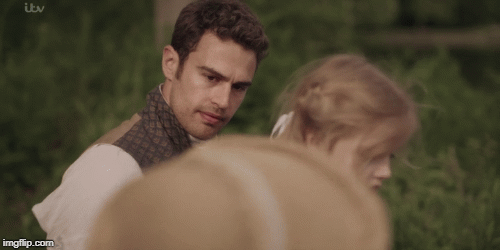
Fortunatelylori: Awwww! This is Sidney essentially seeing his unborn children in Charlotte’s eyes. (that is the most romantic lyric in the English language and no one will convince me otherwise)
However, what ends up happening? Sidney lowers his guard just in time for Charlotte to reactivate her suspicions which leads to their most explosive fight to date:
Episode 4
Sidney: Did we not agree that you would look out for Georgiana? Keep her out of trouble? I should have known you weren’t to be trusted.
Charlotte: And I should have known, despite your professed concern, you care nothing for her happiness.
Sidney: I would ask you to refrain from making judgments about a situation you don’t understand.
Charlotte: I understand perfectly well!
Sidney: Of course you do! Even though you’ve known Georgiana but a handful of weeks and him but a matter of hours.
Charlotte: That was time enough to learn that Mr. Molyneux is as respectable a gentleman as I have ever had cause to meet.
Sidney: You seem to find it impossible to distinguish between the truth and your own opinion!
Charlotte: The truth? You wish to speak of the truth, Mr. Parker? The truth is you are so blinded by prejudice that you would judge a man by the color of his skin alone.
Sidney: You speak out of turn.
Charlotte: Why should I expect any better from a man whose fortune is so tainted with the stain of slavery!
Sidney: That is enough! … I do not need to justify myself to you.
They essentially spiral out of control in this scene. Sidney’s trust issues come back and his lack of feed-back to Charlotte’s accusations make her provide increasingly horrible explanations to fill in the blanks.
Because their fights tend to be very intense (they are both people with very strong personalities), it���s easy to think of the two of them as simply not being compatible.
But their issues aren’t a matter of compatibility but rather an inability to find the right channels on which to communicate with each other, despite both wanting to.
Which brings us to episode 5
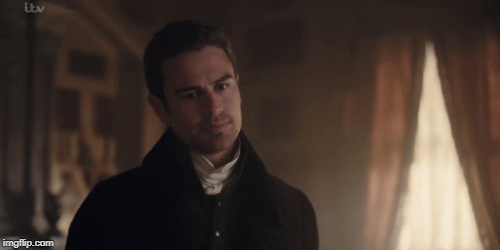
I love these little acting choices Theo James makes. This sigh is so evocative because it’s pretty clear it’s not frustration or boredom, but rather Sidney still reeling from her accusations in episode 4.

On the other side, Charlotte looks at him and thinks he is distant and non-affected and because, despite being angry, she still wants to connect with him, she tries so hard to use Sidney’s acerbic wit against him and keeps attempting to poke the big grizzly bear:
Charlotte: I assume you are here for the cricket.
Sidney: Never short of assumptions, Miss Heywood.
Unable to find a chink in his cold shoulder, Charlotte tries again at the cricket match:
Charlotte: Good luck to you too, Mr. Parker. Although I imagine you don’t think you’ll need it.
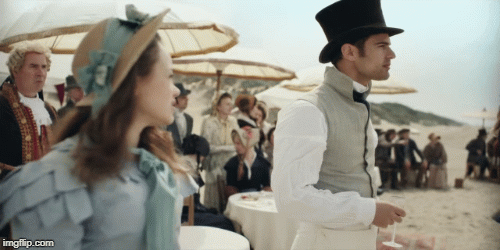
Sidney: Yes more assumptions, Miss Heywood?
Sidney is so pissed at her in this episode, not even her low key flirting with James Stringer galvanizes him.
But then something quite unexpected happens … Without actually realizing it, Charlotte manages to find the right channel to communicate on:
Stringer: You haven’t got another player to replace him. We win.
Charlotte: I’ll play.
With the wide eyed enthusiasm of a true romantic, Charlotte taps into the core of what Sidney desperately needs in his life. She doesn’t just help and support him when he needs her to but crucially she doesn’t put a price tag on it.
Charlotte: Is that a smile I detected?
Sidney: Oh, I doubt it …
Charlotte doesn’t enter the cricket match because she wants to use that gesture to ask Sidney for money for her pyramid scheme or gaslight him into thinking her betrayal was actually her “waiting” for him. Charlotte does it because she wants to see him smile. And just look at him …
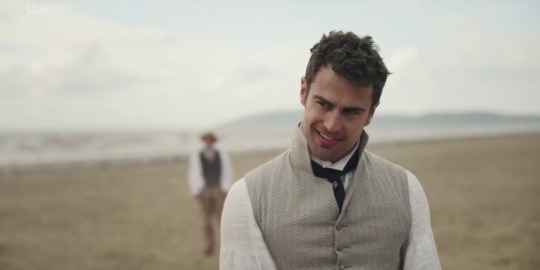
Unfortunately that momentary progress is derailed again when Georgiana is kidnapped which will eventually lead to the carriage scene in episode 6 where Charlotte’s need for feed-back clashes with Sidney’s trust issues in their most revealing conversation.
It’s tempting to look at this argument and think Sidney is the only one who is in the wrong and who needs to change. But that would be missing a few important aspects of the story.
Charlotte: Otis never meant to place Georgiana in harm’s way. Any more than I did.
Sidney: And yet you both did.
I think a lot of people, Charlotte included, fall into the trap of believing that if someone didn’t intend to harm someone else that means they haven’t actually done something wrong. Which is why there are still people in the Sanditon tag that are resisting the idea that Tom Parker is a villain. Surely he never meant to hurt his brother and he didn’t force him to propose to Eliza, so why is everyone so hard on him?
But like Charlotte had to learn with Otis, just because Tom didn’t intend to cause Sidney harm doesn’t change the fact that he very much did.
In this case, Charlotte’s major mistake was not that she helped Georgiana stay in touch with Otis. Charlotte’s mistake was in assuming she had the whole 1000 piece puzzle completed when she only had about 200 pieces in place.
Charlotte: All I ever cared about was Georgiana’s happiness.
Sidney: What did you think I cared about?
Charlotte: That is anyone’s guess!
Sidney: I’ve done the best I can by Georgiana.
Charlotte: No! At every turn you have abdicated responsibility. If you truly cared for her welfare, you would have watched over her yourself.
Sidney: It is a role I neither sought or asked for.
Charlotte: Of course not! Because you are determined to remain an outlier. God forbid you give something of yourself!
Sidney: Please do not presume to know my mind, Miss Heywood.
Charlotte: How could anyone know your mind? You take pains to be unknowable. All I know is that you cannot bear the idea of two people being in love.
Despite admitting she doesn’t know his mind, Charlotte can’t help herself from filling in the blanks with what she assumes is a conscious desire to be uncaring. Because she doesn’t have the life experience to come up with another answer.
For his part, Sidney is hurt by her lack of trust in him but unwilling to trust her enough in return to tell her the whole story. Still her words do affect him enough to make him begin to lower his barrier and give Theo James one of his best acting moments:
Sidney: And what do you know of love? Apart from what you’ve read?
Charlotte: I would sooner be naïve than insensible of feeling.
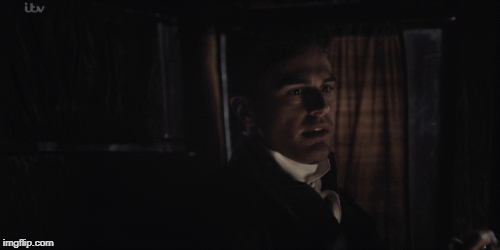
Sidney: Is that really what you think of me? I’m sorry that you think that. How much easier my life would have been if I were …
Fortunatelylori: I just … he’s very good … that is all
It would be very tempting to assume that since Charlotte admits to being naïve once the whole Otis and Georgiana’s situation is revealed:
Charlotte: It’s all so overwhelming! I hardly know what to think anymore. (beat) About anything! I’ve always felt so certain of my judgment. But now I see that I have been blinded by sentiment and naivety. How could I have gotten it all so wrong? No wonder your brother has such a poor opinion of me …
and Sidney begins to show more outward concern for the people around him and validate Charlotte in ever increasingly romantic ways:
Charlotte: I know … I’m too headstrong. I’m too opinionated. I’m too …
Sidney: No. You are not too anything. Don’t doubt yourself. You’re more than equal to any woman here.
That their clashing world views are now aligned. But the truth is, Sidney isn’t the one to explain to Charlotte how it was that he became “insensible of feeling”. It’s Tom that tells her that story (and then promptly bungles whatever help he might have provided his brother). Sidney’s trust issues remain which is evident even as late as episode 8:
Babbington: I believe she’s tamed me.
Sidney: Yes … I just imagine how that might feel.
And
Sidney: I have never wanted to put myself in someone else’s power before.
Don’t get me wrong, I melt every time I hear that second line but it is indicative of the fact that love still feels like an inherently risky and dangerous thing for Sidney where he is obliged to hand over his power to someone else and pray that person doesn’t abuse it the way Eliza did.
For Charlotte’s part, Sidney beginning to reveal more of himself and show her the true man underneath the armor, makes her fall more and more in love with him. And the more she loves him, the more afraid she is of outwardly showing it. His confusion over his feelings for her and Eliza’s reappearance in his life, cause her to attempt to fill in the blanks again in episode 7. First by proxy, while talking to James Stringer:
Charlotte: You are far too sensible to form such a misguided and futile attachment.
Stringer: Why should it be futile, Miss Heywood? For all you know your feelings are repaid 5 times over.
Charlotte: I allowed myself to believe so for the briefest of moments. But I cannot deny the evidence of my own eyes.
And then directly:
Sidney: I hope you weren’t too offended by Mrs. Campion. It was only meant in jest.
Charlotte: Is that all I am to you? A source of amusement?
Sidney: No. Of course not! You’re … Forgive me.
Charlotte: On the contrary, you’ve done me a great service. I am no longer in any doubt as to how you regard me.
So what happens in episode 8? Well, they essentially trade places, going from this:
Charlotte: I hope you won’t think too badly of me.
Sidney: Think too badly of you? I don’t think of you at all, Miss Heywood.
To this:
Sidney: Tell me you don’t think too badly of me.
Charlotte: I don’t think badly of you.
In one of my metas I made the point that Sidney Parker IS Charlotte Heywood’s coming of age story: he is her first love, the first man she is sexually attracted to, her first kiss and well … unfortunately also her first (and hopefully only) heartbreak.
By being forced to deal with her own sense of loss and the pain of being separated from the person she loves, Charlotte will finally be able to understand the true nature of Sidney’s insensitivity of feeling. Instead of causing her suspicion or apprehension, she will be able to connect with it because she’s lived through it herself.
As for Sidney … I don’t think it’s a coincidence that in the end he is forced to do to Charlotte what Eliza did to him all those years ago. He chooses to marry a wealthy woman he does not love and disappoint a poor woman whom he does love.
I think given that his motives are obviously altruistic while Eliza’s were not (both per Tom’s story as well as her general character as revealed in the show so far), the point of the similarity is not to bring him closer to Eliza. Certainly not when he’s looking at Charlotte like this:

Which means that him being forced to contend with what happened 10 years ago by reliving the incident, this time in the role of the aggressor, is there to increase his level of vulnerability and put him in the place of the earnest person trying to reach out for emotional connection and having to fight to pull down the walls he himself helped put up in Charlotte.
You know what they say … If you really want to know someone, walk a mile in their shoes. No one ever said those shoes would be comfortable.
#sanditon#sanditon meta#sidlotte#sidlotte meta#jane austen adaptations#sidney parker#charlotte heywood#sense and sensibility#sanditonmetacollab
122 notes
·
View notes
Text
60+ Tarot Card Analysis Ideas
On this celebration, they provide 3 mins absolutely free, regardless of the chosen solution. In other words, you can pick a tarot card reading for love, a psychic conversation, and even a fortune-telling session if thats what you want. Although they request for your bank card information, they just bill you after your session ends.
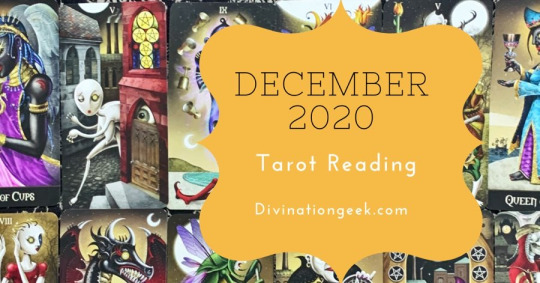
One of the most essential tarot pattern utilized in these 2 nations was the Tarot card of Marseilles of Milanese origin. The earliest enduring tarot cards are the 15 or two Visconti-Sforza tarot card decks repainted in the mid-15th century for the rulers of the Duchy of Milan. He explained a 60-card deck with 16 cards having photos of the Roman gods and fits depicting four sort of birds. Other very early decks that likewise showcased classical motifs include the Sola-Busca and Boiardo-Viti decks of the 1490s. Alongside the usage of tarot card cards to divine for others by specialist cartomancers, tarot is likewise made use of widely as a device for seeking individual advice and also spiritual development. You can think about a tarot card reading as a way to tell your life story, including the components that have not happened yet. The reading won't be rather as certain as your preferred book, however it will certainly be all about you. You're the story's main personality, though the tarot card story most likely consists of details concerning individuals and scenarios around you. This business has actually been in business because 1989, offering extremely exact psychic readings by chat, phone, as well as live video clip. They enable you to make a decision based on understanding the context. To further comprehend just how tarot cards work as well as just how they can assist shed light on your lovemaking, you shouldnt ask closed-ended inquiries. Also a easy free love tarot reading can use you extremely helpful details. You can get to a greater understanding when it concerns factors that influence your past, present, as well as future partnerships. Keep reading to discover exactly how psychic support can work in your support. Every deck has its own subtleties, and also every visitor has their very own analyses. I was therefore determined asked him to select a card for me after my interview-- something I can focus on or learn from. He 'd reportedly been doing complimentary tarot readings at a French coffee shop for several years; as just recently as 2017, a Facebook user posted that he still appeared on Wednesdays, as did a TripAdvisor reviewer. At its many fundamental, tarot card tells tales about the cycles of our lives. Mixing the deck, choosing cards and laying them out in order discloses what different tests and tribulations we might encounter during any type of provided journey. Nonetheless, the cards in the significant arcana do not necessarily represent us in a offered reading; they may stand for another person in our lives, or represent even more general concerns. Tarot is a complicated language, as well as every reading is various; similarly, every viewers as well as the methodology they make use of to translate the method the cards communicate is different. This is just one of the more varied sites absolutely free tarot readings online. You do not need to use them for each analysis, yet it's a great way to get started while you discover the cards. Among the easiest readings you can make use of to acquaint yourself with the cards is the past, present, future spread. Take the leading card from your shuffled deck, as well as expose them one by one, left to right. While you shuffle, assume meticulously about the area of your life in which you 'd like extra quality for. Experts typically believe tarot card cards can help the private explore one's spiritual path. Expert fortuneteller contend times been implicated of charlatanism. Heavy use of the Rider-Waite-Smith Tarot card was also advertised in the works of Eden Gray, whose three books on the tarot card made comprehensive use the deck. With cost-free psychic readings by means of an e-mail address, you won't obtain the advantage of listening to the individual's voice or seeing their face, yet you do get to take your time with the discussion in such a way that's unrushed. With e-mail, you do not have to await the psychic to be on-line and available to converse with you. Instead, send an e-mail question whenever the mood strikes, as well as your advisor will compose back to your e-mail address as quickly as they can. With cost-free analyses, you'll generally need to get rid of your charge card details and also an e-mail address to access the services. We'll also give you a couple of pointers on what to anticipate during your first tarot analysis, and also explain how tarot card readings work. A three-card spread has the visitor draw three cards from the deck after it's been mixed and cut in half by the querent. Typically, the first called pulled represents the past, the second stands for the present, as well as the third represents the future. Just how those timelines are interpreted depends on the analysis and the concern being asked-- "future" may indicate tomorrow or it might indicate one decade from now. The most popular and well-known deck is the Rider-Waite, drawn by illustrator Pamela Colman Smith and also published in 1910. These cards are recognized for their simple images, their straightforward color pattern, and also their importance. Furthermore, the Minor Arcana likewise includes 40 phoned number cards which are organized into 4 Matches of 10 cards each. These stand for the different scenarios that we come across in our daily lives. Oranum is your best choice if you like on the internet tarot card reading solutions using video conversation as opposed to messages or call. Although there are a large number of love psychics offered online, it is essential to select a service that is genuine, trustworthy, and customer-friendly in nature. With many choices readily available at the click of a computer mouse, choosing a genuine tarot card reading area is always hard. Shuffling and dealing with the cards is a great means to literally connect with the deck that you're utilizing. As instinct is an essential element of a analysis, you'll require to bring on your own right into the cards. Try to shuffle at least once, yet nevertheless often times you feel is necessary to obtain the cards " gotten rid of". I'm sure if you're right here, you're already filled with inquiries. Many people end up being curious regarding tarot card when they are confronted with excellent uncertainty in their lives. As well as when the cards are utilized appropriately, they show to be a awesome tool to aid you take into consideration other point of views as well as move on in the most effective method possible. I've been utilizing Psychic Resource for years and also they have actually always been really friendly, compassionate, and exact. Because the earliest tarot card cards were hand-painted, the variety of the decks created is thought to have been small. https://tarot-masters.com was just after the innovation of the printing press that automation of cards came to be possible. The expansion of tarot outside of Italy, initially to France and Switzerland, occurred during the Italian Battles. Right Here at Golden String Tarot card, we recognize that tarot is not about disclosing a fixed future, yet instead concerning exploring your unconscious self. He drew a deck from his breast pocket-- evidently, he brings the significant arcana from the Marseille deck with him almost everywhere-- as well as picked The Lovers card. Everybody typically obtains excited when The Lovers turns up in a analysis, given that we all assume that it indicates advantages for our lovemaking; yet it does not always show romantic love in any way. While they are an on the internet reading service and also can talk, they mainly do tarot analyses by phone. While that's impressive in itself, what really attracts attention concerning this network is the experience of the tarot card masters you discover there. They provide informative analyses that use the tarot as a tool to magnificent information regarding a person's conditions. They have actually developed tarot card checking out to the point of it being an art kind and I've constantly found out more concerning myself as well as exactly how to navigate my existing life circumstance from hanging out on the site. Kasamba has been supplying tarot readings on the internet for two decades now. There are several tarot card decks available, and also each deck and visitor are one-of-a-kind. The viewers will establish the cards out in different patterns using differing varieties of cards. Hence, if you do select a expert love psychic analysis, youll be able to come close to the next events in your life with even more guts. You can discover every information you need to find out about your existing and future love life. Likewise, youll learn to make the ideal choices and depend on the right people. What you really need in order to utilize the power of a tarot reading to the optimum, is a very intuitive and experienced overview. The interpretation offered by a actual psychic is the result of experiences given from generation to generation. According to many psychic sources on free love tarot details, you must ask open-ended questions. This is since tarot cards can help you clear up the topic, not tell you what to do. Lots of people suggest the Rider-Waite deck for newbies, as the cards' significances are so typically instinctive-- as well as when they're not, plenty of interpretation guides exist in books and online. Several decks, including the Rider-Waite, included a little sheet of paper specifying each of the card's most typical analyses. Though tarot card cards have actually handled a mystical meaning in the cultural imagination, they were originally intended as even more of a party game. The cards have actually been used because at the very least the mid-15th century; the earliest taped decks came from numerous parts of Italy. I think I can assist you comprehend the covert significance of things. Our totally free tarot card readings should enable you to recognize your future better as well as comprehend what awaits you. Tarot card readings are a powerful form of prophecy that utilize an old deck of cards to aid you discover response to your crucial questions about love, connections, your career, financial resources and also more. Psychics as well as foreteller have actually made use of Tarot cards for centuries, and also Trusted Tarot card will certainly provide you an accurate analysis that's personalized based the cards you choose and also the order you select them. Every card has a various meaning relying on its placement, so you will get a one-of-a-kind as well as in-depth viewpoint on your current situation. To prepare for your reading, I suggest that you listen to this grounding excercise - then scroll down as well as select your cards. The tarot card deck includes 78 cards, each of which is associated with its very own particular imagery, meaning, as well as tale. Out of the 78 cards, there are 22 significant Arcana cards that stand for the karmic as well as spiritual lessons of a person's life. The 56 Minor Arcana cards represent the tribulations and also trials that we, as people, face in our day-to-days live. Among the Minor Arcana cards, there are 16 Tarot Court Cards which represent 16 various personality type that we reveal at various times.
1 note
·
View note
Text
60+ Tarot Analysis Concepts
On this occasion, they offer 3 minutes completely free, regardless of the selected solution. In other words, you can pick a tarot card analysis for love, a psychic chat, and even a fortune-telling session if thats what you desire. Although they request your credit card info, they just charge you after your session ends. The most important tarot pattern used in these 2 nations was the Tarot card of Marseilles of Milanese beginning. The earliest surviving tarot cards are the 15 approximately Visconti-Sforza tarot decks repainted in the mid-15th century for the leaders of the Duchy of Milan. He explained a 60-card deck with 16 cards having photos of the Roman gods as well as suits portraying 4 type of birds. Other very early decks that additionally showcased classical motifs consist of the Sola-Busca and also Boiardo-Viti decks of the 1490s. Alongside the usage of tarot card cards to divine for others by professional cartomancers, tarot card is additionally utilized commonly as a device for looking for individual suggestions and also spiritual growth. You can think about a tarot card reading as a way to inform your life story, consisting of the parts that haven't occurred yet. The reading will not be quite as certain as your preferred book, yet it will certainly be all about you. You're the tale's main personality, though the tarot tale possibly includes details regarding the people and situations around you. This firm has actually been in business because 1989, giving extremely precise psychic readings by chat, phone, and also live video. They enable you to make a decision based upon recognizing the context. To additionally understand just how tarot cards job and how they can assist clarify your lovemaking, you shouldnt ask closed-ended inquiries. Even a simple free love tarot reading can provide you really valuable info. You can get to a greater understanding when it concerns aspects that influence your past, existing, and also future relationships. Read on to find out how psychic advice can work in your favor. Every deck has its own subtleties, and also every reader has their very own interpretations. I was therefore figured out asked him to pick a card for me after my meeting-- something I might concentrate on or pick up from. He 'd apparently been doing free tarot card readings at a French café for several years; as recently as 2017, a Facebook individual posted that he still showed up on Wednesdays, as did a TripAdvisor reviewer. At its many standard, tarot tells tales about the cycles of our lives. Shuffling the deck, picking out cards as well as laying them out in order reveals what various tests as well as adversities we might face during any given trip. However, the cards in the major arcana don't always represent us in a given reading; they might stand for another person in our lives, or represent more basic issues. Tarot is a intricate language, and every analysis is different; likewise, every viewers as well as the approach they utilize to interpret the method the cards communicate is various. This is one of the more different websites free of charge tarot readings online. You do not have to utilize them for every analysis, but it's a great way to get going while you learn more about the cards. One of the most basic analyses you can make use of to acquaint on your own with the cards is the past, existing, future spread. Take the top card from your mixed deck, and expose them one at a time, left to right. While you shuffle, assume thoroughly about the area of your life in which you 'd like extra clearness for. Professionals commonly believe tarot cards can aid the specific discover one's spiritual path. Professional tarot readers have at times been implicated of charlatanism. Esoteric use the Rider-Waite-Smith Tarot was likewise advertised in the works of Eden Gray, whose 3 books on the tarot made substantial use the deck. With totally free psychic analyses by means of an e-mail address, you won't obtain the benefit of hearing the person's voice or seeing their face, but you do reach take your time with the conversation in a manner that's unrushed. With email, you don't need to await the psychic to be online as well as offered to talk with you. Rather, send an e-mail concern whenever the state of mind strikes, and your consultant will create back to your e-mail address as quickly as they can. With free analyses, you'll usually need to part with your charge card info as well as an email address to access the services. We'll also offer you a couple of suggestions on what to anticipate throughout your first tarot analysis, and discuss how tarot card analyses function. A three-card spread has the visitor draw 3 cards from the deck after it's been mixed as well as halved by the querent. Normally, the initial called drew stands for the past, the second represents today, and also the third stands for the future. Just how those timelines are interpreted relies on the analysis and the concern being asked-- "future" may mean tomorrow or it may mean ten years from currently. One of the most popular and also widely known deck is the Rider-Waite, attracted by illustrator Pamela Colman Smith as well as released in 1910. These cards are recognized for their simple images, their basic color design, and also their significance. Additionally, the Minor Arcana also contains 40 numbered cards which are arranged right into 4 Suits of 10 cards each. These stand for the various situations that we run into in our day-to-days live. Oranum is your go-to option if you prefer on the internet tarot card analysis services by means of video clip chat as opposed to messages or call. Although there are a multitude of love psychics readily available online, it is essential to select a solution that is authentic, credible, as well as customer-friendly in nature. With many choices readily available at the click of a mouse, selecting a real tarot reading place is always tough. Evasion and managing the cards is a terrific way to literally connect with the deck that you're using. As intuition is an crucial facet of a analysis, you'll require to bring on your own into the cards. Try to shuffle at the very least when, but nonetheless sometimes you feel is necessary to get the cards "cleared". I'm sure if you're below, you're already loaded with inquiries. Lots of people come to be interested regarding tarot card when they are confronted with great unpredictability in their lives. As well as when the cards are utilized properly, they verify to be a powerful device to aid you consider other viewpoints and also move forward in the most effective method possible. I have actually been using Psychic Resource for many years and also they've constantly been extremely pleasant, caring, and precise. Since the earliest tarot cards were hand-painted, the number of the decks created is thought to have been small. It was only after the innovation of the printing press that mass production of cards became possible. The expansion of tarot card beyond Italy, initially to France and Switzerland, took place throughout the Italian Wars.

Right Here at Golden String Tarot card, we recognize that tarot is not about disclosing a fixed future, but instead regarding exploring your subconscious self. He drew a deck from his breast pocket-- obviously, he lugs the significant arcana from the Marseille deck with him anywhere-- and also chose The Lovers card. Everyone typically gets thrilled when The Lovers shows up in a analysis, because most of us presume that it indicates good ideas for our lovemaking; however it does not always show enchanting love in any way. While they are an on-line reading service and also can talk, they mainly do tarot analyses by phone. While that's impressive in itself, what truly attracts attention about this network is the experience of the tarot card masters you locate there. They give insightful readings that utilize the tarot as a device to magnificent info about a individual's circumstances. They have refined tarot card reviewing to the point of it being an art form and also I have actually constantly found out more concerning myself and also exactly how to navigate my current life situation from hanging out on the site. https://tarot-masters.com has actually been providing tarot readings on-line for two decades currently. There are several tarot card decks offered, and each deck and visitor are distinct. The visitor will certainly establish the cards out in different patterns making use of varying varieties of cards. Therefore, if you do choose a professional love psychic analysis, youll have the ability to approach the next occasions in your life with more guts. You can figure out every detail you require to learn about your current and future love life. Also, youll discover to make the right options and also count on the right people. What you truly require in order to utilize the power of a tarot reading to the maximum, is a very user-friendly and well-informed overview. The interpretation supplied by a genuine psychic is the outcome of experiences passed down from generation to generation. According to a lot of psychic resources on extracurricular relations tarot details, you need to ask flexible inquiries. This is due to the fact that tarot card cards can help you make clear the topic, not tell you what to do. Lots of people suggest the Rider-Waite deck for beginners, as the cards' definitions are so often intuitive-- as well as when they're not, lots of analysis guides exist in publications as well as online. Many decks, including the Rider-Waite, come with a little sheet of paper defining each of the card's most typical analyses. Though tarot cards have tackled a mystical definition in the social creativity, they were initially meant as even more of a party game. The cards have been utilized considering that a minimum of the mid-15th century; the earliest tape-recorded decks originated in various parts of Italy. I think I can help you comprehend the surprise meaning of points. Our complimentary tarot readings should enable you to comprehend your future far better and recognize what awaits you. Tarot card analyses are a effective type of divination that utilize an old deck of cards to aid you discover response to your most important concerns regarding love, connections, your job, funds and even more. Psychics and foreteller have actually made use of Tarot card cards for centuries, as well as Relied on Tarot card will give you an accurate reading that's individualized based the cards you pick and also the order you pick them. Every card has a different definition depending upon its placement, so you will get a special as well as thorough point of view on your present scenario. To get ready for your analysis, I advise that you pay attention to this grounding excercise - then scroll down and also select your cards. The tarot card deck contains 78 cards, each of which is associated with its own certain imagery, importance, and also tale. Out of the 78 cards, there are 22 major Arcana cards that represent the karmic as well as spiritual lessons of a individual's life. The 56 Minor Arcana cards signify the adversities as well as trials that we, as humans, face in our daily lives. Amongst the Minor Arcana cards, there are 16 Tarot Court Cards which stand for 16 different characteristic that we express at various times.
1 note
·
View note
Text
This is a (meandering, non-exhaustive) overview of Homestuck’s use of

by which I do not mean examples of psychological realism in a character’s words and deeds, but rather the various means by which characters’ psyches are expressed outside of themselves. I wish to elaborate on how thoughts, feelings, and desires may find expression in the environment, in the medium of the story itself, and in the form of other characters.
That’s perhaps a little vague, so here’s a ready example of what I mean: brainghost!Dirk. He talks with Jake, but since he is a construct of Jake’s mind, Jake is essentially talking to himself. Brainghost!Dirk is an alienated medium for voicing Jake’s own thoughts, irretrievably distorted through its intermingling with what Jake thinks/wishes Dirk would say (not unlike a puppet). I am claiming that this mode of characterization is not a unique to Jake; the blurring of inner and outer voices is omnipresent throughout the story.
Or, rephrased: what I hope to show is that a great deal of Homestuck is haunted with brain-ghosts, of one kind or other.
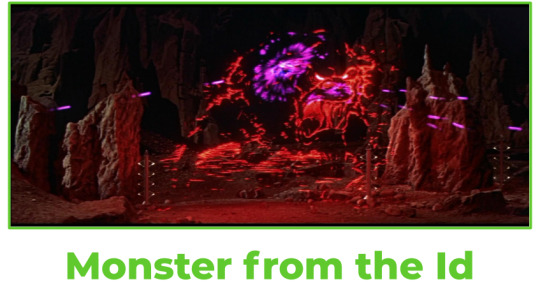
An early example of this kind of storytelling in science fiction would be the film Forbidden Planet (1956). The film contains a pair of conflicts which eventually reveal themselves to be one: the scientist Morbius wants some space explorers to get off his planet, and an immense monster (pictured above) appears during the night to attack the explorers. Morbius, it turns out, has been experimenting with a machine capable of turning thought into reality. So when Morbius sleeps, his dream of driving off the trespassers materializes in the form of beast that forcefully enacts the wish.
The beast is declared a “monster from the id”, the “id” being a concept borrowed from Freudian psychology, indicating the part of the mind responsible for the unfiltered generation of impulses, of urges. In the film, this passing mention of psychoanalysis precedes the revelation of Morbius’s link to the beast.
Homestuck hints towards its own mixing of thought and reality with a device similar to Morbius’s dream machine: Sburb.

A snapshot of Dave’s Sburb client (1519) shows that the final subprograms launched during the games installation make reference to terminology associated with Carl Jung and Sigmund Freud. The terms suggest that Sburb interacts with the ideas in the kids’ subconscious minds (archetypes) and brings symbolic representations of these ideas into conscious reality (manifests the ideas). The game alters the means by which reality is constructed. As with Forbidden Planet, a major result of this is id monsters.
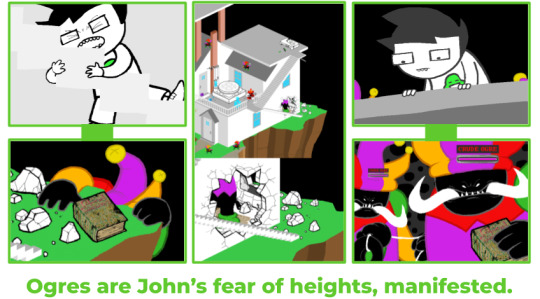
When John slips on a staircase, he flips out (left, 560). And when he nearly launches himself into the abyss with the Pogo Hammer, he has to take a nap before he has calmed down enough to continue (center, 637). Immediately following both moments of vertigo, massive ogres appear. The eventual fight with the ogres begins after John looks over the edge of the platform above his house, into the abyss (right, 662).
All of this suggests that Sburb is reacting to John’s emotional state (fear) to produce in-game content. The game functions as a waking dream.
It should also be noted that Sburb provokes the reactions it elicits. Karkat once mentioned a nagging feeling that the game was mocking him by giving him a planet covered in the candy red blood he had spent a lifetime attempting to hide (2301). Karkat’s paranoia seems to be correct here, and moreover applicable to the cast in general -- John’s house was likely placed atop an immense spire /in order to/ bring John’s dread of falling into sharp relief. The suspicion can be substantiated with a few related motifs.
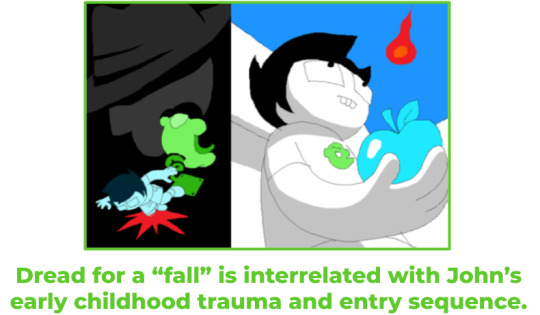
The story provides two likely origins for John’s fear of heights: his own fall from the slime pogo as a child (2626) and the death of Nanna, which John believed resulted from her falling from a ladder and being crushed by a book (52). What’s more, Sburb’s invocation of the Fall of Man (Adam and Eve being cast from the Garden of Eden) via biting into an apple hints that there is an allegorical significance to John’s more literal fear of heights.
We can apply these patterns to other characters in an attempt to learn more about them. LOLAR being covered in ocean suggests that Rose is afraid of water, with the likely cause of Rose finding Jaspers dead and washed up on a riverbank (presumed drowned). Dave speaks openly about how his sword fights with Bro left him anxious of metal sounds (7749), meaning the grinding gears of LOHAC were a personalized hell for Dave. Jade’s first imp manifests in response to the sight of a yellow aurora (2998), inviting the reader to investigate why that image invokes a fear response.
But we won’t get to into all of that, not for now at least. Let’s take a step back.
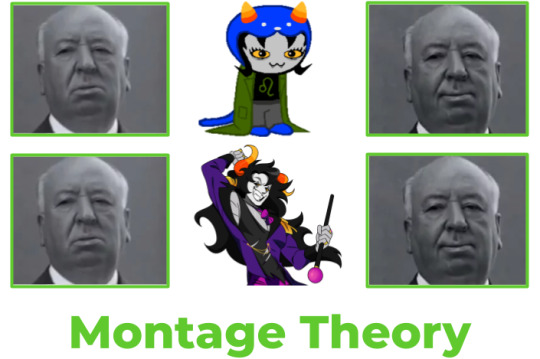
For my reading of the imps as manifestations I’ve been leaning heavily on a piece of film theory devoted to the effects of sequential images. The sequence above constitutes two observations. One, that by this arrangement the viewer will infer the old man sees and reacts to the middle figure. Two, that the viewer’s impression of the old man will change based on the content of the central image, even if his expression is the same. Is he smiling at Nepeta or warm embrace Marvus’s armpit? The answer may influence your interpretation of the little smile.
The neat thing about montage is that the interrupting frame need not bear any obvious relation to what precedes or follows in order to be subject to a causal reading. Moments that occur sequentially can be read as triggering one another, even if what follows any particular moment appears to be a break rather than a continuation.
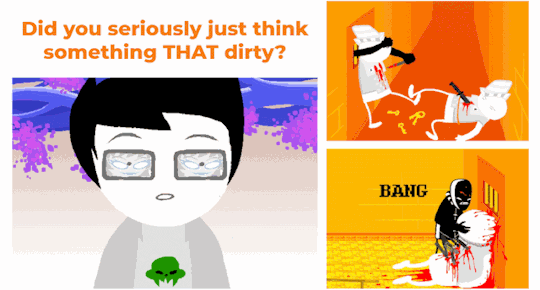
Example: There’s a moment where Aranea walks into Jake’s dream, and brainghost!Dirk immediately starts razzing Jake about his attraction to the alien girl and threatening to give him a boner. The scene is interrupted by Jack committing a series of gratuitous murders. We then cut back to Jake, and bg!Dirk is now teasing him about his dirty thoughts.
DIRK: You have got to be kidding. Did you seriously just think something THAT dirty? DIRK: You must be doing this on purpose to spite me now. I mean, just wow dude. That was x-rated as fuck.
JAKE: (No no stop. See youre talking about it and now i cant help it!) JAKE: (You are psyching me into having dirty thoughts get fucking lost you interloping brain douche!!!)
DIRK: Don't worry, I'm gone. It's like a goddamn peep show in here and I feel like a sleazy piece of shit watching this from a dark corner of your mind. DIRK: You have a graphic imagination, English. I'm kind of impressed.
JAKE: (Shut up theyre just thoughts its not even like im trying to have them THEY DONT MEAN ANYTHING!)
The ostensible joke is that bg!Dirk is exaggerating or outright fabricating his account of Jake’s thoughts in order to hassle him. But by way of montage, one can infer that we /have/ seen Jake’s dirty thoughts, in the form of Jack’s display of overwhelming bloodlust. Violence is superimposed over the sexually explicit.
Whether the scene literally takes place in Jake’s mind is secondary (though such a reading would explain why Jake’s brain ghost is even aware of Jack) -- the use of montage allows Jack’s actions to function as a /metaphor/ for Jake’s thought.
Another example of Jack functioning as a murderous/libidinous avatar would be the death of Mom and Dad. At their little tea party, Dad spills some wine on Mom’s clothes and declares that she must disrobe immediately (so that Dad might launder the garment). Mom calls the aromas wafting from his pipe sensuous. The two clasp hands and declare that all they need is eachother. Then they die! The joke is that while Bec Noir is ostensibly an interruption to date night, he also functions as its culmination, with murder acting as substitute for the sex act.
The link between violence and sexuality is perhaps a hard sell, but I hope to convince you that the reading holds merit. Let me emphasize that the very act of Mom and Dad holding hands was itself sexually loaded.
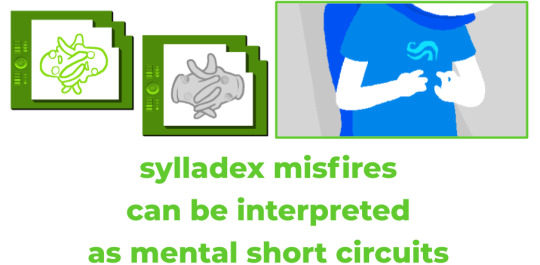
I owe to HS liveblogger elfstuck the insight that John’s linear 3 card sylladex is a reflection of his short attention span. Consider how John’s role as a game character means he is thrown all around his room, back and forth, as the player figures out what to make of the situation. If you ignore the fourth wall, you’re left with an extremely distracted person, who attention flows easily from one object to another. Accepting the object-in, object-out nature of John’s sylladex and the resulting shenanigans as a metaphor for this, it would follow that the sylladex in general can offer an abstract representation of thought.
In passing, I can mention how the enormity of Jake’s sylladex (it cannot even fit on the page, and contains an object that exceed most players’ size limits) would imply that despite evidence to the contrary, the boy likely has a big brain (and perhaps its being offscreen suggests Jakes own unawareness of much of his own thought). Dirk’s comment about avoiding items that are difficult to shoehorn into his mnemonic schema (4535) could be read as a difficulty maintaining information that doesn’t fit into his personal mental models. The sylladex becomes a metaphor for the mind that requires interpretation.
Under this mode of thought, the moments when Jade’s pictionary modus fails to correctly interpret her drawing become akin to a mental slip-of-the-tongue. For the Tanglebuddies to be misread as enmeshed hands implies an association, in Jade’s mind, of horny Squiddles and clasped hands. John affirms the association much later by miming Tanglebuddies as he attempts to grapple with the question of whether Jade and Davesprite are sexually compatible (5294):
JOHN: how do things even work if you marry a sprite?
JADE: what do you mean
JOHN: i mean... JOHN: ok, he has a ghost butt, for one thing.
JADE: uh JADE: so
JOHN: a GHOST BUTT, jade!
JADE: SO WHAT IF HE HAS A GHOST BUTT!!!!!
JOHN: i'm just saying...
JADE: WHATEVER YOURE JUST SAYING, JUST STOP SAYING IT! JADE: and whatever youre trying to gesture with your hands there, stop doing that too!

It should also be noted that before launching into her “daring dream”, waxing poetic on the miraculous union of the human and the animal with her hands clasped in wonder, Jade successfully captchalogued the Tanglebuddies (796). And more to the point, Jade’s pose in reproduced during discussions of cherub (5961) and leprechaun (6007) reproduction. Hand-holding becomes representative of an (oft-sexualized) union, underlining the euphemistic nature of Mom and Dad’s post-contact demise.
The next example of using montage to communicate thought requires a little more buildup.
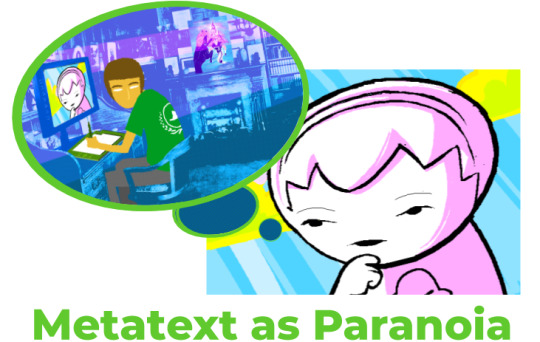
There’s a gag in Rose’s introduction where the reader tells Rose to play with her writing journals, and scoots the journals under the bed and retorts that she would only do that if no one were watching (220). At first glance, the moment scans as a minor meta joke in a story filled with meta jokes -- but the trick is that Rose does not /know/ herself to be a video game character, her every movement controlled and observed. Rather, she /believes/ this to be true -- the joke about being watched establishes that Rose is paranoid, as will become apparent in the hostility she assigns to Mom’s every action.
The command prompt and narration are themselves brain ghosts of a sort: the voice deployed in them is always linked to the present point-of-view character. The insults that precede character introductions ( “Zoosmell Pooplord”, etc) become marks of anxiety, an intrusive proclamation of what the kids at times think of themselves (and/or what they think others think of them). “Nice time management skills, sweetheart!” becomes a bit of self-deprecation Rose as she procrastinates, which Rose experiences as having been voiced by some objective observer who judges her deficiencies.
A blurred line divides characters from the voice at the back of their head, belonging to the (presumed) omniscient, omnipotent author-god. This is why avatar!Hussie is dressed as Calliope when he is killed by Lord English. Both Calliope and Hussie are a voice in Caliborn’s head, and thus both present apparent obstacles to an unmediated self.
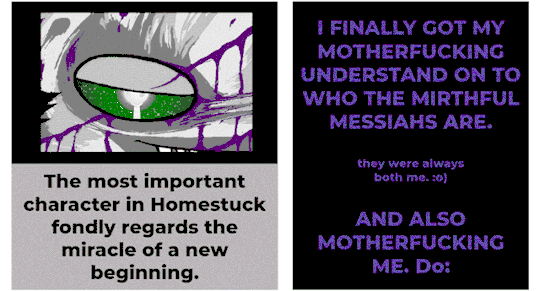
The left panel (3219) foreshadows the right (3358). Gamzee is not being declared the objectively most important character in Homestuck. Rather, Gamzee is declaring himself /to have been declared/ the most important character in the story. The line establishes that Gamzee believes himself to be in a story (with an author!) and that this author has declared him paramount. Furthermore, “fondly regarding creation” is an modus operandi of Problem Sleuth’s Godhead Pickle Inspector. Applying that turn of phrase to Gamzee’s actions further establishes that Gamzee believes himself to /be/ the god-author declaring his own importance. So it should come as no surprise that 137 pages later, Gamzee outright proclaims himself to be the god(s) he worships.
Going back to montage, it becomes interesting that this snapshot of Gamzee’s megalomania is inter-cut with the creation of Jadesprite -- the moment that dead!dream!Jade merges with Bec, forming a unity with a deity not unlike the unity Gamzee claims with his mirthful messiahs. The interweaving would suggest that Jade and/or Jadesprite experienced analogous thoughts of megalomania upon the moment of ascension.
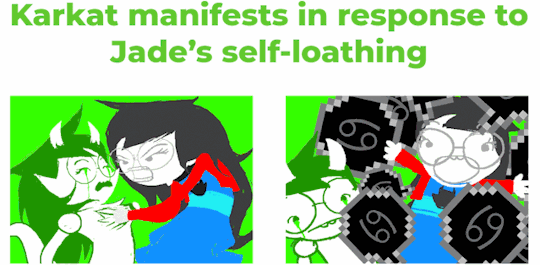
This would be a good point to mention that not only imps and ogres, but trolls also function as manifestations for the people they impose upon. Karkat is not only an interruption here, but also a continuation. He points out that Jade’s self-loathing, that she cannot safely distance herself from the qualities of Jadesprite she finds distasteful. This is precisely why Karkat ends the conversation by telling Jade to turn off the fourth wall (which divides the self!), as well as the reason he imagines Jade making out with herself: Karkat is on every front presenting the prospect of union with oneself.
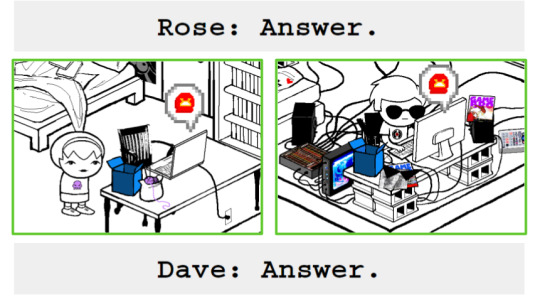
The notion of trolls as manifestations first emerges clearly when Rose and Dave receive their packages from John. As they finish reading John’s letter, each is suddenly contacted by a troll and greeted with the command “Answer.” Critically, by word alone it is ambiguous as to whether the command refers to answering the troll or the letter. And as it turns out, these answer occur simultaneously: Rose and Dave’s responses to the letters are embedded in the subsequent conversations.
Rose receives a letter poking fun at her pretensions, claiming that her attempts to hide her affections for people are futile. In response we get Kanaya, who imperiously proclaims her disdain for Rose, only to suddenly change tact and explicitly seek Rose’s friendship, an entreaty which the oft paranoid Rose accepts. Dave receives a letter imploring him to let go of his insecurities and express himself. In response we get Tavros, the very picture of insecurity, who is fixated on the idea of making Dave shit himself (as part of an ‘emotional constipation’ motif that follows Dave). And Dave complies, in a sense, by way of the quasi-ironic gay treatise that compels Tavros to block him. Each conversation addresses the issues laid out in John’s letter.
Examples can be found throughout the comic. Equius remarking that he talks to Gamzee every day (2220) establishes that Gamzee is regularly haunted by the thoughts of domination that Equius voices -- both in the literal and metaphorical sense. Erisolsprite referring to Dirk as a rock 2oliid piiece of a22 and then calling himself 2ociiopathiic for even thinking something so callous (5516) expresses a conflict already present in Jake’s own mind, echoing the frustration with his own dirty thoughts expressed by the argument with brainghost!Dirk. Feferi’s pronounced enthusiasm for the imminent apocalypse should cause you to question Kanaya’s seemingly neutral resignation towards the end of the world, since Feferi manifests for Kanaya (2328). And so on.
The person being trolled is always being confronted with thoughts or feelings or memories already present within themself. Alien contact always doubles as a brain ghost haunting.
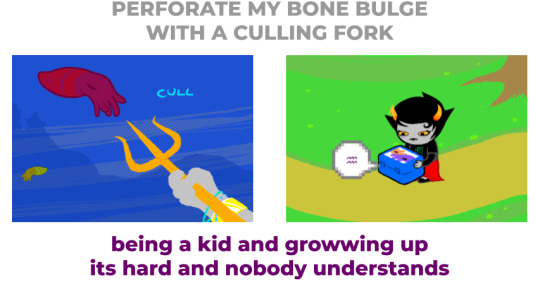
Another example, with some buildup: Karkat invokes the phrase “PERFORATE MY BONE BULGE WITH A CULLING FORK” to express his contempt for Vriska, and on subsequent pages we see Feferi pointing her culling fork at a cuttlefish (2181), as if to suggest that the creature symbolizes the bone bulge. Fast forward to Kanaya, who has just gotten through a conversation with Vriska and finds herself haunted by Eridan, who keeps going on about his romantic desperations and insisting (correctly) that Kanaya’s crush on Vriska is itself romantic. That his notification erupts from an image of cuttlefish held at Kanaya’s waist adds to the air of yearning, as though her own bulge is rumbling. The scene is capped off with a double entendre: “its hard and nobody understands” is playfully poignant jab at an inability to understand one’s own desires (among other things).
And Homestuck devotes a lot of attention to desire.
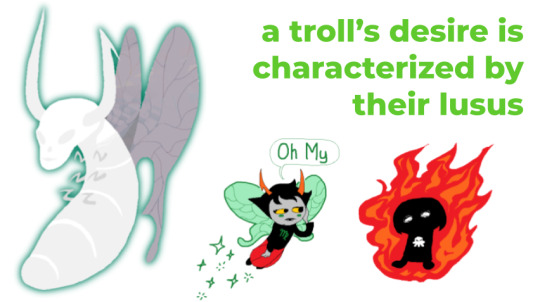
It’s long been acknowledged by the fandom at large that Kanaya’s attraction to Light players functions as a joke on the proverbial moth-to-the-flame. As reconciliation with the fire destroys the moth, there’s a morbid tinge to the attraction, as though it doubles as a death wish. And the wish is granted -- when Kanaya dies in Homestuck, she dies to light, either from Eridan’s wand or the laser blasts unleashed by HIC. Even the death of Kanaya’s lusus pertains to light -- the matriorb ripped from her innards is shaped like a miniature sun, as if to establish some loose link between the notion of motherhood and the incandescence Kanaya eventually achieves.
This can be generalized into a principle wherein lusii (and the circumstances of their deaths!) can functions as analogies for the desire of the wards.
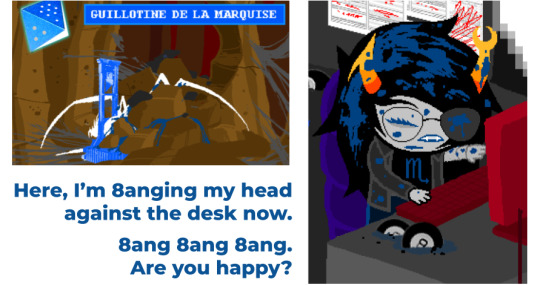
Vriska, for example, desires execution. When offering Terezi a flimsy apology for crippling Tavros and proxy-murdering Aradia, Vriska offers to slam her head against her desk in penitence. This moment should be read against Vriska’s addiction to breaking 8 balls, and leaving the broken shards lying around as though she’s inviting the “bad luck” of stepping on them. It /is/ an invitation. Vriska seeks love via violent retribution against herself. This is why in the right panel, Vriska’s blood-spattered head is juxtaposed with a broken 8 ball: the blood came from Spidermom’s execution (which characterizes Vriska’s desire), and motif of 8R8K H34DS connects the moment to Vriska’s idea of apology.
Like Kanaya, Vriska (to a degree) seems to structure her love life along these lines. In the words of @azdoine:
like ppl are actually out here writing Vriska as the top as if her entire Act 5 character arc isn’t about bratting out until Terezi has no choice but to punish her
“oh noo, I, the thief of light, stole all of your luck, and made the coin land on the scratched side! now you have to kill me! but I’m probably going to get away with everything, because you don’t have the guts to stab me with that sword of yours!!!!!!!! if only there was somebody, like you, who could prove me wrong!”
EXTREMELY SUBTLE THERE, VRISKA
Vriska’s approach to wooing Tavros also revolves around baiting execution:

The scene: Tavros leads a horde of imps and ogres into a mystery cave, the top of which is adorned with kissing lizards and an alchemical symbol. Tavros is putting a puzzle of a frog together, but Vriska has already pieced together the puzzle: making a frog universe is, in part, a cipher for personal reproduction. The Ultimate Alchemy is making a baby! And as Vriska says, “real gamers cut to the chase. They power through all the nonsense and go for the gold.” So she brings Tavros to LOMAT and makes the moves on him.
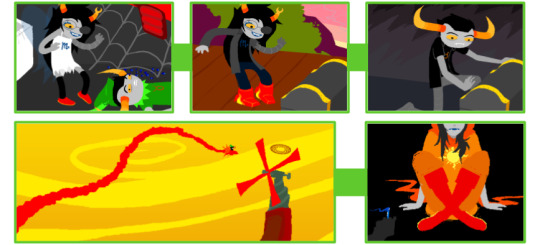
Tavros is equated to a treasure chest by the repeated use of framing and Vriska is GOING FOR THE GOLD, like a WINNER. Tavros later reaches into the same chest for his lance before heading off to attempt to kill Vriska -- affirming that the treasure Vriska seeks here is Tavros’s “lance”.
This setup was suggested by the conversation accompanying the kissing salamanders: Vriska gives Tavros a map with a big red X, saying he should take his legion of imps through the gate and go defeat his denizen. The gate actually leads to Vriska, but she isn’t lying. She is positioning herself to be Tavros’s final boss. The imps are manifestations of Tavros’s pent up rage (much of which was generated by Vriska’s harassment), and Vriska wants Tavros to take that anger out on her. Hence the later panel which uses Vriska’s boots to place a big red X directly over her groin, making explicit the implicit goal of Tavros’s trip to the windmill X-gate.
This pursuit of love through violent comeuppance may have something to do with Vriska’s bitter disappointment that ghost!Aradia did not seem to hate her.
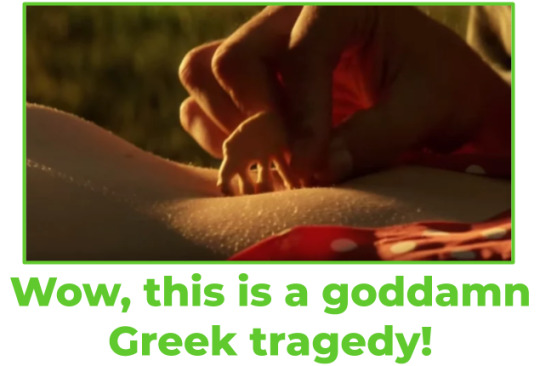
An intermission/introduction of sorts, as we bridge from one discussion of desire to another: did you know that Michael Bay’s Armageddon (1998) structures itself in part around Freud’s Oedipus complex? I say this in total sincerity.
The plot: a meteor the size of Texas bears down upon the Earth, threatening armageddon. Luckily, a crew of rough-and-tumble oil drillers are ready to fly into space and split that mother in two. Oh HELL yeah.
Except, wait, the movie’s actually about family drama: Bruce Willis finds Ben Affleck sleeping with his daughter Liv Tyler; Willis proceeds to chase Affleck around the oil rig with a shotgun, bang bang bang. Not Allowed. The Protective-Father-Hates-Your-Boyfriend dynamic is presented as an Oedipal triad of sorts: although Tyler is not literally Affleck’s mother, she performs the mom-function of “forbidden object of desire” -- and Willis opening fire is equivalent to the castration said to await trespassers onto maternal soil.
The above reading is buttressed by jokes: Armageddon appears to function within an implicit dream machine, such that the characters’ thoughts and fears can become manifest in their environment. So when it comes to pass that whenever Affleck climbs into a hole (heehee), a pipe breaks (hoohoo), and suddenly everything goes boom, I read that as Affleck reliving the consequences of boning Tyler, packaged in such a way that the Freudian fear of castration is more explicit. (The relevance of Oedipus to the proceedings adds some humor to Steve Buscemi declaring the entire disastrous situation a “Greek tragedy”)
At any rate, after some shenanigans, Willis comes to accept Affleck’s claim to his daughter and confers the deed, as it were. Willis gives the young couple his blessing and they get married. Hooray!
Except, wait, the movie’s actually about the perpetuation of the oil industry: the dream machine was declared at the beginning of the movie when a petty street-side argument triggered the first barrage of meteors. The meteor the size of Texas (aka Dotty) is triggered by conflicts that haunt the central cast -- namely Willis, who enters the film hitting golf balls at a Green Peace boat. On a metaphorical level, Dotty is a golf ball the size of Texas, striking directly at the Earth instead its self-declared representatives. There’s a certain irony here: the film lampshades that the men who are destroying the world have been tasked with saving it.
The family drama folds into the environmentalist angle: Liv Tyler is a symbol of the earth (which gets drilled). This is the joke when Affleck is bouncing animal crackers around on her belly like she’s host to the Savannah: she kind of is! It’s no coincidence that Willis confers ownership of the oil rig at the same moment that he offers his daughter’s hand in marriage: the motifs are being discussed simultaneously.
But enough of all of that: back to Homestuck.

Armageddon’s simultaneous casting of Liv Tyler into the roles of earth and mother offers a glimpse at the interpretive possibilities made available by Hussie’s statement that Homestuck is in a way a synonym for Earthbound (an RPG in which “homesickness” is a status ailment which can be cured by calling your mom). Stuckness or boundness can be deployed to communicate a sense of longing for “home”.
A good chunk of Homestuck is built upon feelings of nostalgia, taken to mean a sort of intense separation anxiety with the past. John speaks about this when he watches Con Air with Jade – John wants the movie to feel like it did when he watched it with his Dad long ago, but the feeling from when he was a kid is gone. This upsets him. Moreover, John’s freakout starts at the moment Cyrus puts a gun to the bunny’s head (5286): Con Air itself is partly about Nic Cage trying to return to the life he lost when he went to jail, and ‘putting the bunny back in the box’ is a metaphor for the attempt. Cyrus, in threatening the bunny, is highlighting his role as a force preventing things from going back to how they were. Thus, if we are to believe that John is responding to the movie thematically, Cyrus confronts John with his own inability to go back to a happier past – his inability to go home -- and this recognition is met with anger.
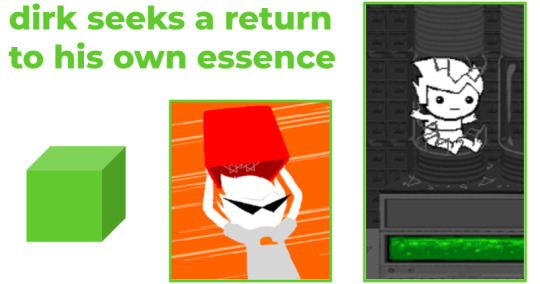
In making the leap to the psychoanalytic motifs, it helps to recall the part where baby!Dirk responds to being born by cracking open his ectotube and crawling back inside. Dirk, who aspires towards his “ultimate self”, illustrates here that he envisions his ascension as a return to the ‘essence’ of Dirk from which he (and all other iterations of himself) arose, as represented by the ectoslime. Baby!Dirk gestures at unity with his ectoslime/essence by crawling back into the place from which he was born, which I’m basically claiming is a “return to the womb” on a symbolic level, or at least that this is a useful parallel to draw. (A related motif to think about: Dirk decapitates himself by sticking his head inside a box, which as per Con Air symbolizes the place you wish to return to)
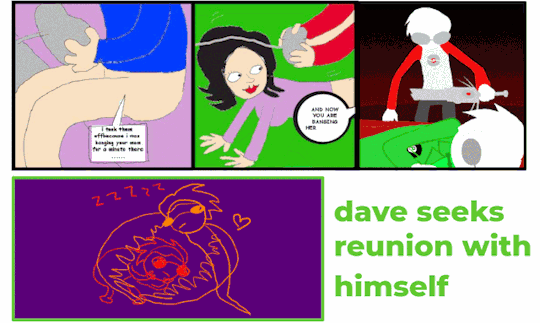
[Hella Jeff sez: “i took (my pants) off because i was banging your mom for a minute there..... AND NOW YOU ARE BANGING HER”]
Castration becomes unavoidable as you try to relate all of this to Dave, whose occasional references to banging hot moms are part of an ongoing reference to the Oedipus Complex. Critically, the complex is not /just/ about wanting to bone your mom, but also fear that your dad will chop your junk off if you do. The breaking of Dave’s sword on the rooftop is a realization of this fear (yes, we’re doing the “swords are phallic” thing). But Dave has no mom that he knows of, so what gives?
The answer is in the way Bro inexplicably breaks the record emblem on Dave’s t-shirt, as though he has introduced a fissure into Dave’s very identity. Life with Bro has made it very difficult for Dave to be honest with himself, which is to say, Dave pictures Bro’s abuse as having divided him from an ideal “true self”, which can feel emotions without all the anxious ironic detachment. I mentioned before that seeking unity with that from which you came is a “return to the womb”. This is the sense in which the Oedipal mom attraction becomes relevant: the return to the past is sexualized. The ‘home’ Dave wishes to return to is /himself/, and in this sense Dave is his own hot mom (which is related to how often Dave compliments his own looks, as well as the above gif suggesting Dave’s boner – he is literally/metaphorically “attracted” to himself).
(Incidentally: this model of desire, in which a broken subject attempt to become whole again by seeking out its lost half, is basically the concept of the soulmate, as laid out by Plato. Cherub reproduction turns the metaphysical pursuit of one’s lost half into a plot-level objective)
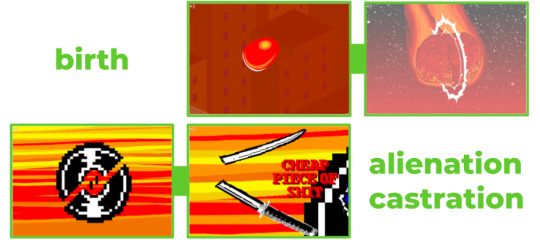
John’s entry item (apple) was linked to fear embodied in a childhood trauma (the Fall), and the same can be said of Dave. Hatching from the shell that contained your primordial goop (Dirk) is analogous to being violently separated from yourself (Dave), which is why Dave’s entry item (an egg) hatching coincided with Bro slicing the meteor in half: the abuse that divided Dave from himself, his “castration” by Bro, is simultaneously the “birth” that separated Dave from his “mother” (which is also Dave).
The general idea is that birth = self-alienation = castration, insofar as all are depicted as modes of being separated from oneself.
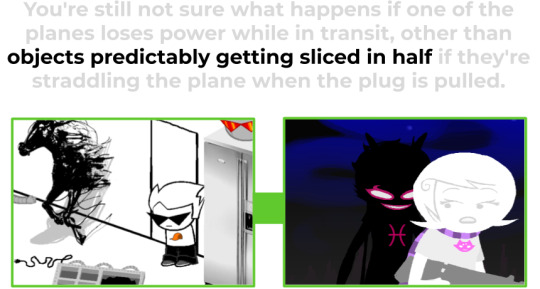
The broad motif of ‘being separated from oneself’ can be very useful for identifying brain ghosts in unexpected places. Take for example, Roxy’s fenestrated planes: when they are introduced the narrative is quick to tell us that if someone were caught half in/out of one of the windows when the power cuts out, they would be sliced in half. By the rule of Chekhov’s gun, this introduction should mean we should eventually see someone get gorily bisected by the window, but alas we never do.
Instead, when Gcat warped the panel away, trapping Roxy between the windows, we were shown the image of a bisected horse puppet in Dirk’s apartment, This signals that Chekhov’s gun has indeed gone off. But rather than splitting a body, it split a soul: Meenah’s introduction follows the sequence because Roxy has generated a shadow of herself, a doppelganger. This is not without precedent: an earlier portion of this post was devoted to exploring the fourth wall as a mode of self-alienation. Roxy’s panel mishap can be considered part of that pattern.
If Meenah functions as an extension of Roxy, all of her actions can be read as bearing some relations to Roxy’s own latent thoughts and desires. Prior to the epilogues, for example, Meenah imploring John not to give her the ring seemed to be yet another Fuck You to the late Chekov: the issue never comes up again. But a psychic link between Meenah and Roxy would suggest that John broke his promise to Meenah by giving the ring to Roxy, and that whatever motivations compelled Meenah to make her request in the first place would also apply to Roxy.

Decapitation is yet another mode of self-alienation, and thus can be construed as a mode of birth. Hence the image of Lil Sebastian hatching from his shell of taxidermied man meat. That’s a motif unto itself, but what I wish to call attention to is the match-cut from John’s broke body to Jake’s broken tower. The juxtaposition collapses the images into metaphor, such that Jake’s loose dome in the woods becomes a decapitated head -- an appropriate addition to the pumpkin patch it rests in, given all the Headless Horseman jokes. We can look to Dirk for for another example of a headless horse-man of the house echoing the head: for a guy who idealizes decapitation to such a degree, it is striking that Sburb aims to provoke him by reattaching his beheaded apartment to its underlying units.
Houses act as metaphors for heads, then “Homestuck” could also interpreted as “head trapped” -- like the title emphasizes confinement within one’s own mind. Such a reading offers up Failure to Launch and Arrested Development (posters on John and Jane’s walls) as alternate synonyms for Homestuck, as each satirizes (or outright mocks) potential failure states in the process of inter-personal and mental development (ie “growing up”). Like Earthbound, both lean on a sense of homesickness in characterizing despondency, as though characters are haunted by the needs that defined their childhood -- or else find themselves needing that childhood itself.
But collapsing nostalgia into infantile regression is far from the only way to approach the house/heads equation. One might read the transformation and growth of houses with Sburb as metaphors for expanding the mind. One might infer that the choreography of events within houses can map out thoughts like dancing bees. One might take the metaphor as a foothold for interpreting the significance of the Sburb logo being at once a house and a window. \I have my own thoughts about Homestuck’s brain-ghost haunted house-minds, but for now, I only hope that this document has raised some interesting questions -- and ideally, that the interpretive approaches I’ve described might be useful in seeking answers.
#homestuck#homestuck meta#this is basically the contents of the stream#movies#john#rose#dave#jade#jake#dirk#roxy#gamzee#vriska#4th wall#psychoanalysis#house as head#plato
308 notes
·
View notes